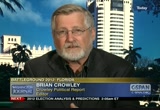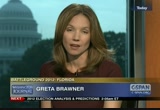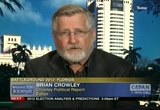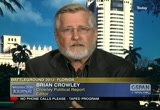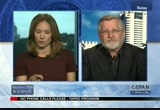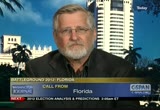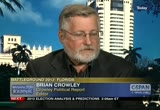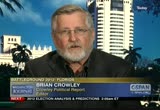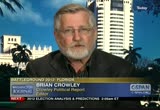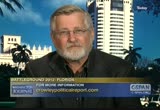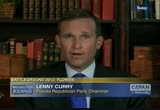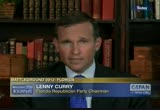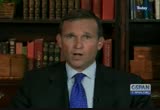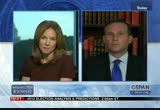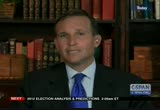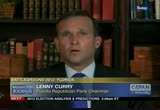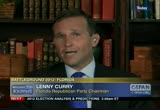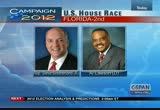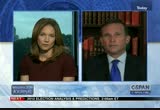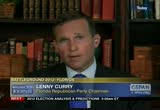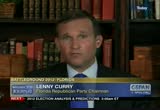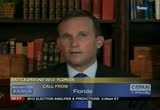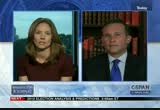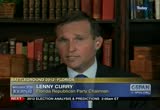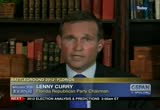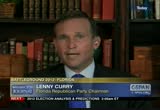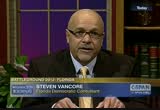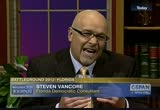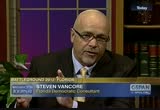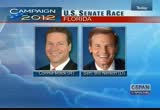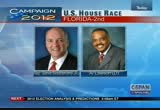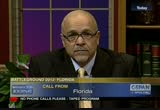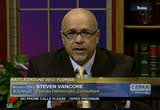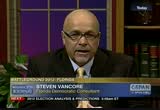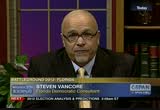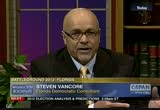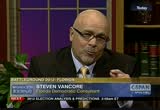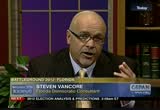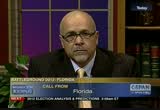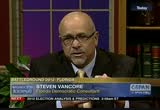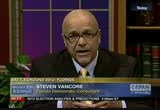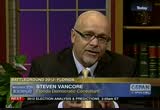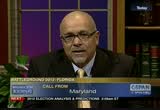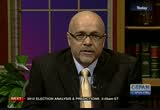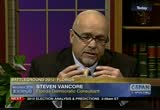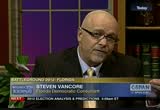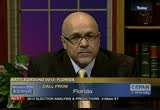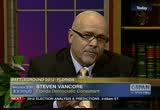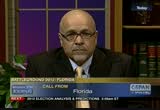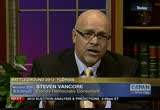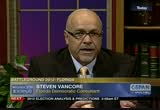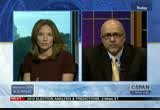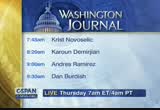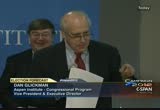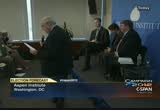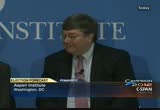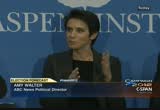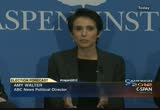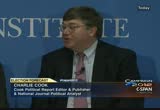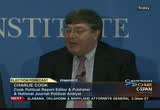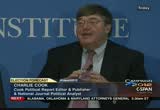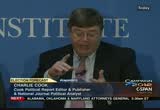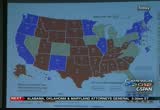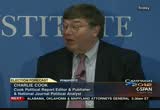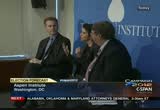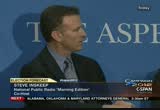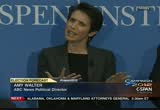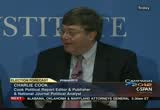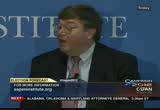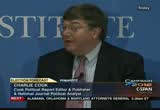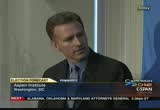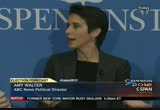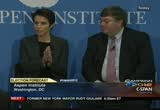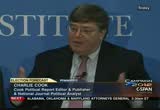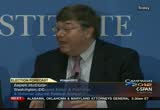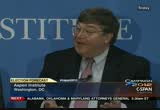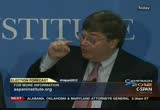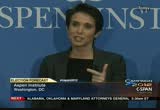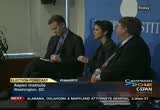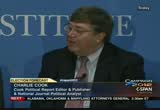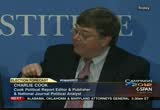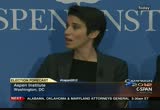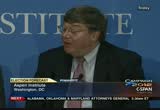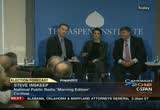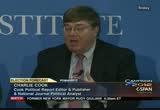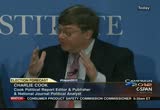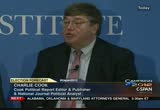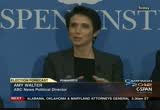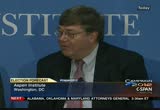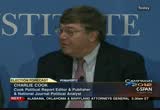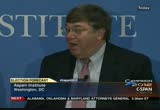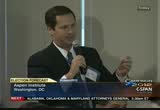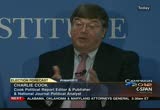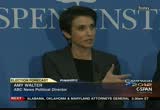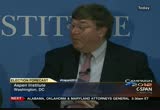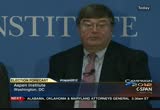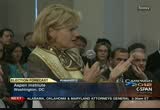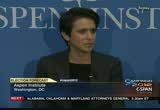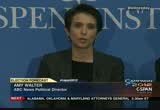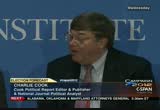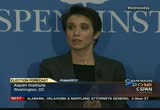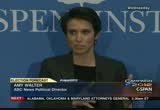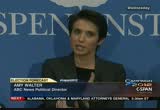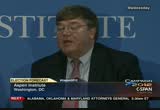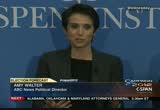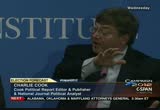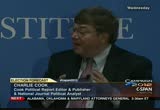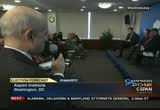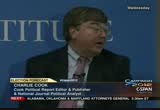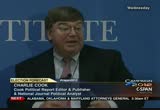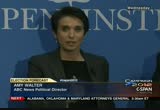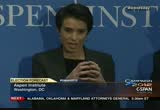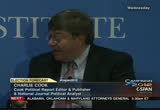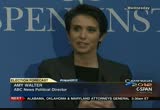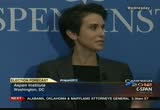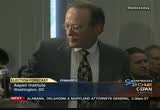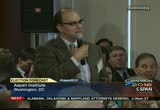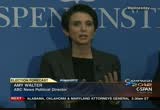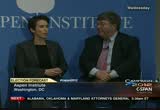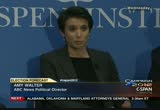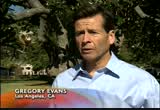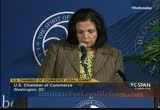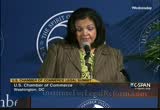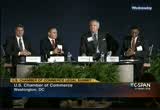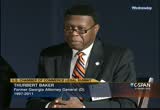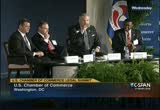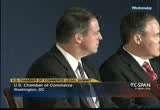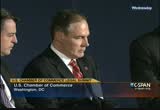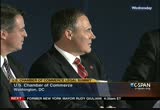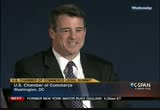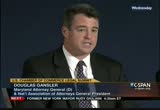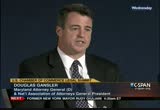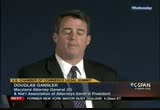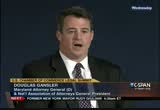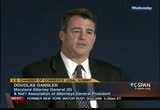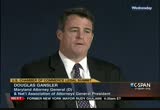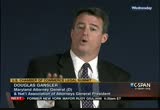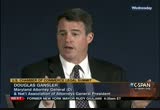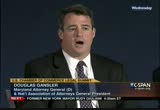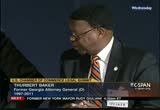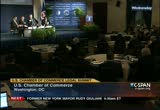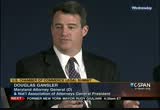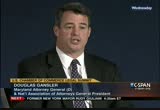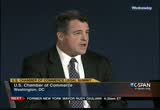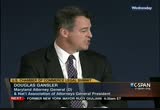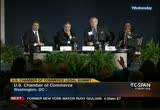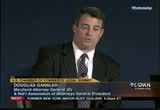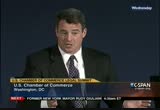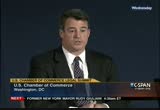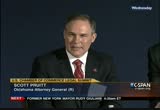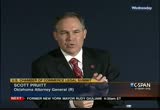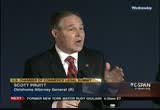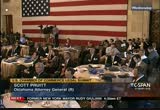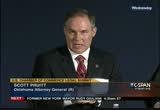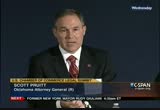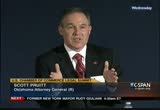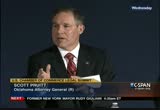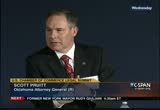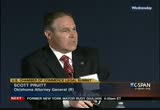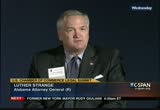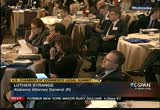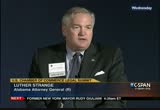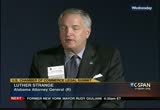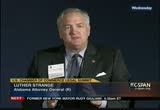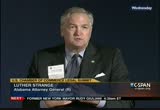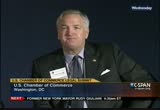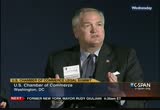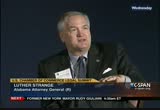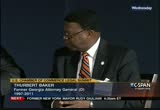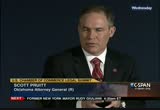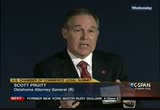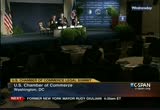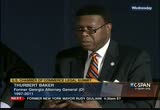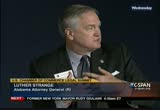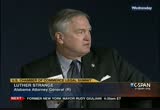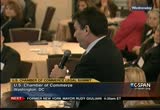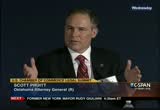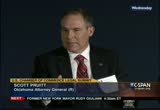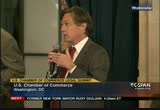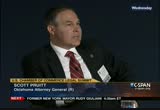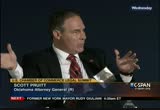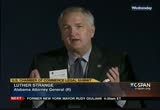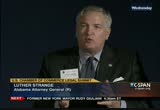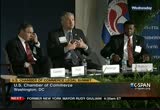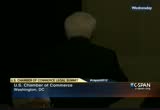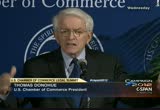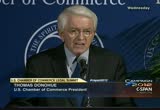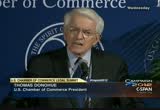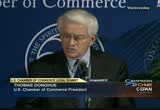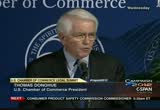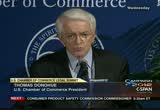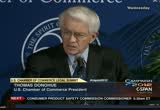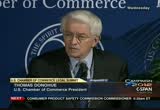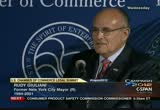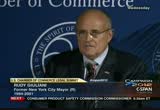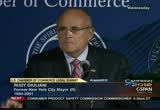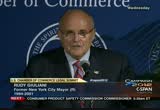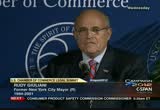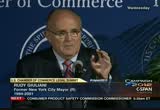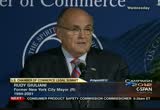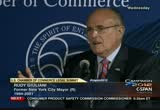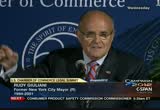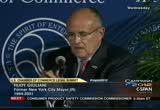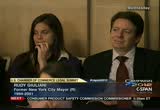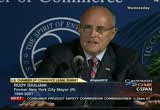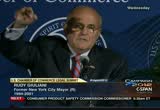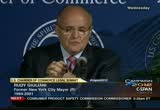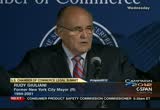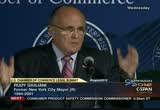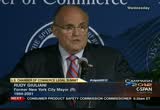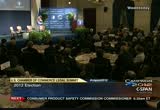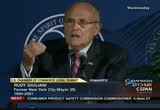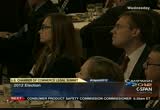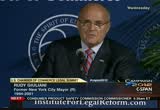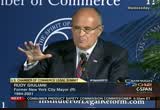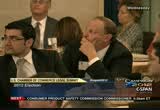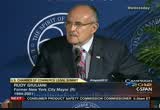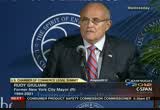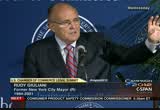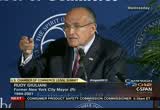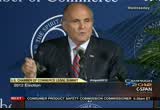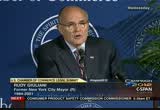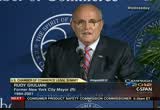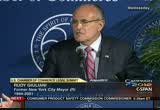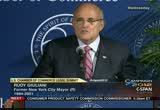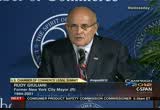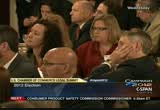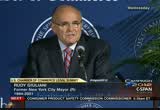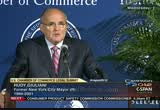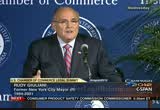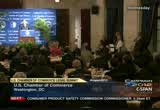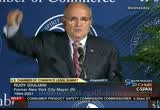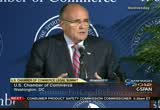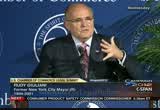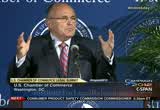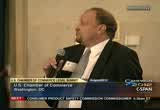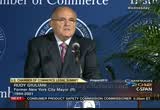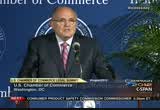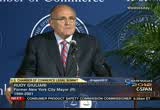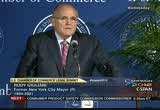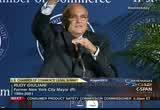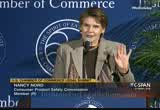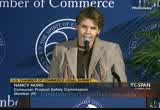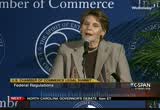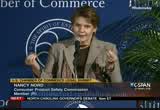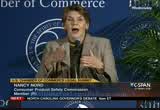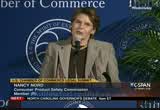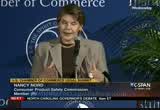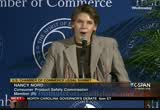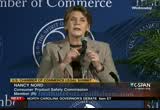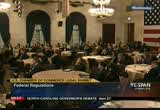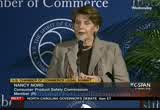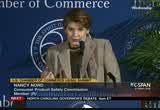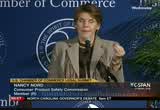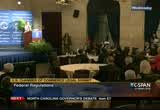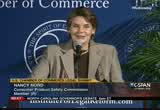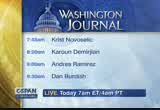tv Capitol Hill Hearings CSPAN October 25, 2012 1:00am-6:00am EDT
1:00 am
first debate when the president seemed a distant and in some ways ill-prepared. he certainly seems to have found his stride a bit in the last few weeks, but some missteps by the democrats over the last 11, 12 months have helped lead to this point where it is a much closer race than they expected. host: we are talking about the battleground state of florida here, with candidates crisscrossing across the country and hitting each of these nine battleground states and pouring their resources into these states as well. we will continue over the next nine days looking at swing states. as brian crowley mentioned, unemployment in that state, 8.7% in september. the 2008 vote went to president obama with a net of 2.8% in that state. this talk about unemployment and the economy, brian crowley. how much of that is a factor in florida?
1:01 am
guest: i don't think it was a coincidence that during the foreign policy debate, mitt romney kept bringing it back to the economy. most people turning in were not going to be paying that close attention to some of the foreign policy issues, and i don't think many \ voters go to the polls to vote based on what our decisions will be with china or cuba, for that matter. but they do vote with their pocketbooks. statewide unemployment in florida is 8.7%, but it is much higher in various pockets of florida. in some counties, as high as 12% unemployment. as we all know, that does not talk about the under-employed. the economy is still struggling in florida. we have signs of it getting better, but i heard a story that foreclosures in the state are the highest in the nation.
1:02 am
there's a lot of economic pressure in the state. people are feeling the pain, and whoever sells the economic message best is going to do well in this state. i should add that the republican party in the state is very strong. >> they not only have the governor's office and three cabinet offices, but the state democratic party is probably the weakest it has been in its history. host: michael, independent caller ban. caller: my name is michael, and no matter who wins, whether it is ronny, obama, or even the third party, we have a war going on in afghanistan and elsewhere, but we have a war on our borders, that the drug war, like in florida. my question is -- it's like the legalize organization mafia is going against the mafia itself.
1:03 am
the question is, again, who is going to benefit from this thing in the end? is it going to be the states or is it going to be the mafia itself? host: michael, what are you referring to? caller: drug war, weapons brought in, and agents being shot. host: ok. brian crowley, is that an issue in florida? guest: i thought it was very telling during the foreign policy debate that there was no discussion about latin america, mexico, no discussion of cuba or haiti. in mexico, the drug war is very intense. we have and border issues there. it was very telling that these campaigns did not get into those issues in any depth, or at all in some cases.
1:04 am
i guess it just circles me back to they clearly believe -- certainly the republicans clearly believe that the economy is the overriding issue for voters. 1.5 million voters in this state are hispanic. many of these hispanic voters have a fairly recent ties to their homeland and other parts of the world. i think that not addressing that community more directly was perhaps a mistake that night. host: jeb bush, the former florida governor, and the head of the free cuba center in dc write in today's "wall street journal" -- "president kennedy showed fortitude and resolve in forcing the soviet union to stand down. whoever wins the election ought to deal similarly with today's intimidation and deception from the castro regime." boca raton, florida caller -- brian crowley, did you want to jump in on that?
1:05 am
guest: one of the things missed by people outside the state is that the cuban vote, while not what it used to be, certainly a hard-core exile community that believes in the embargo and his hardcore with issues relating to cuba, but there are second- and third- and fourth-generation cuban-americans that have more distance from castro and the regime and are more likely to vote democrat and more likely to not favor the continuation of the embargo. host: roy, go ahead. caller: i live about five miles away from lynn university, and i felt a strong empathic connection to my candidate mitt romney that night had i been moderating, i would have grilled mitt romney a little bit more on his domestic policy. on the home front, i am just wondering if mr. romney and his wife are ever going to consider taking another position, or are they going to keep bumping their private sectors in missionary,
1:06 am
grinding their knees? host: we will move on. just for those who may have missed this, for election night 2012, what will you be watching for? guest: i am going to be watching the democratic margin in broward, dade, and palm beach counties. it is critical for the president that he has very large numbers in these counties. that is where he built up his lead. in 2008, the president won 14 of 67 counties.
1:07 am
he needs to really win big in those counties by several hundred thousand votes. the south florida margin in 2008 was 535,000 votes. if he doesn't do well in south florida, he is going to lose. he also needs to at least keep it close in hillsborough county, the tampa bay area. the republicans would do well to win big in hillsborough county. the republicans will win in a lot of the other smaller, rural counties. they should do well in southwest florida, the fort myers-sarasota area. if we see any slippage in that area, that would spell some trouble for mitt romney. orlando -- the democrats should win the orlando area. the president should benefit from the large puerto rican population that is heavily democrat in the orlando area.
1:08 am
if he is not doing well in the orlando area, it is not a good night for president obama. host: before we let you go, could we have a repeat of 2000, bush v. gore? >> there was an error on the ballots that went out. the irritating about 30,000 ballots and they have workers that have come in and they are copying the ballots people have said in on to new ballots. because the ones that are defective cannot go through the calculators. they have to take newly printed ballots and the voters who sent in their ballot, they are capping -- copying that voters' ballots. there are observers from both the presidential campaigns and the parties as well as state officials that have come down to observe and i am sure there are
1:09 am
many lawyers in the room to observe this process. as they try to transcribe and copy these ballot. i would not be surprised if this -- this election turned out to be exceptionally close in florida if we do not to challenge is to this absentee ballots. guest: what about early voting? guest: it ends three days before the election. a lot of up to the pilots have already come in. we will find some very heavy early voting. it is worth noting that the democrats have a by pundits thousand voter registration -- have a 500,000 voter registration. 2.8 million our independence. 11.8 million voters in the state. host: brian crowley.
1:10 am
covering statewide races and the florida for many decades. take you very much for your time this morning. host: the chairman of the republican party is joining us to continue our conversation about what florida as one of the nine swing states and its are focusing on. host: from jacksonville, florida, lenny curry, the chairman of the republican party to continue our conversation about why florida is one of the nine swing states. we just heard from our last guest that democrats hold a 500,000 voter registration advantage over the republicans. what is your ground game like in florida? guest: they held a 600,000 votes advantage if you go back over a year ago. we narrowed that to around 450, 460. we have made significant progress. we feel like we are in a good spot in terms of our base. the polls show that the momentum has moved towards mitt romney on undecideds.
1:11 am
it is putting everything we have right now into turning out the republican base. host: describe your ground game. what is your strategy? guest: it is door knocking. that is coupled with the message that the governor romney is putting forward. our ground game right now is exponentially better than it was in 2008. it is unlike anything we have seen since 2004. there is a lot of energy out there. volunteers, they really began pouring in after the first debate. host: your volunteers are pouring in? how many volunteers on the ground? guest: we have over 40 offices throughout the state of florida. these offices are packed on any given day. over 10 million voter contacts. we are ahead of where we were at this stage in 2004 when george w. bush carried florida. we're not taking anything for
1:12 am
granted. the obama campaign has a really good ground game in florida. we're going to be working down to the wire. we feel like we are prepared and we're going to continue to contact voters. host: the importance of hillsborough county, how is it looking for republicans? guest: i heard him say that obama would have to keep -- hillsborough county has called every presidential election since 1960 with the exception of one. it is important. the time i've spent in hillsborough county, when you look at what is on the ground, there were many more mitt romney signs compared to the obama signs. the energy four years ago, our internal polling tells us we are in a good spot.
1:13 am
with mitt romney in these counties that matter. the president, then senator, played well as in a certain county in 2008. that 49% of the vote. it would allow him if he did that again to minimize his losses here and offset anything we might do in south florida. we do not expect that will happen again. host: what should we be watching for on election night? guest: it is going to be close. on election night, frankly, it is in the hands of the voters. i am going to sit back and believe we put everything we had into this race. that mitt romney's message resonated and we will deliver florida for mitt romney. it will be close, but we will pull it off. host: do you think that the senate race will be close?
1:14 am
guest: here is what we know. connie mack was down significantly prior to the first debate. any poll that we looked at, it looks like a really tough road for connie mack. after the first debate, when mitt romney began to gain momentum, we saw a huge shift in the polling with connie mack and bill nelson. we verified the polling we saw with some of our own data. connie mack is within striking distance. it is not as close as it is with president obama and mitt romney, but if the momentum continues, and he continues his bus tour, it is possible. host: you were talking about mitt romney's message. on twitter --
1:15 am
guest: governor romney demonstrated a very wide understanding of foreign policy. the countries involved, their leaders. the president of the united states said that night that his foreign policy in the middle east and around the world has been a success. benghazi is burning, we have a dead ambassador, a dead american, syria has killed over 50,000 of its people. the white house knew that a terrorist organization took responsibility for the attack and they continued with the message that it was a video. we can have the debate on how to handle the middle east. it is indisputable that the middle east is in chaos right now. it is in chaos under the
1:16 am
leadership of president obama. host: on twitter -- guest: that question is a false question. mitt romney is not going to get rid of social security or medicare. mitt romney has talked about the need to reform medicare for people my age so that it exists for the next generation. medicare is not going to change for existing seniors. host: 29 electoral votes up for grabs. how do florida voters? what is the process? what kind of voting system? guest: there is early voting, which will begin on the 27th. there is absentee voting going on right now.
1:17 am
we have about a 5% advantage on the absentee votes right now. republicans have voted 40,000 more votes than democrats. the good news for us is that going into early voting and to election day, we have about 200,000 more super voters than they do. we feel like we are in a good spot to going back to the ground game given where we are in absentee votes. host: let's get to phone calls. virginia beach, independent caller. caller: i was listening to brian crowley when he was saying that it is important to mention immigration reform. on univision, president obama was given tough questions and did not answer why he did not even put any type of legislation in for hispanics.
1:18 am
in florida, virginia, california, this is an important topic. the president and mitt romney need to answer. they need to let us know if they are looking out for the latinos and they need to let us know what exactly they're doing. host: chairman? guest: you mentioned the president did not do anything about immigration. he did not focus on the economy, deficit. he focused on his health care law. when you want to make the case for change, for firing somebody, you have to demonstrate that they failed. the facts are there. when you look at hiring someone, you look at a resume or their history. history is a good predictor of
1:19 am
how someone will perform in the future. that is why we go through interviews when we hire folks. governor romney has a history of success. salt lake city, staples, sports authority, his business ventures. governor romney will deal with immigration. he will deal with our deficit and he will deal our debt. he will do it successfully based on the history. president obama never had a that track record. host: we're talking with the florida republican chairman joining us from jacksonville. we have a special line for florida residents. our next call comes from a republican in venice, florida. caller: my question, i want to get some information about -- i live in district 16 and i have
1:20 am
not heard anything about the polling on the race with fitzgerald. guest: we believe he will be retained as an incumbent. i would say to the republicans watching, you never want to be apathetic. you never want to take any race for granted. show up and vote for buchanan. we are in a good spot in that race. we expect to retain our incumbent. host: what about the 18th district? also the second district?
1:21 am
guest: our polling tells us that alan west, we expect those incumbents will return to washington. i do not foresee any real problems in those races. we do not want to be apathetic. we are encouraging all of our voters in each congressional district to vote and to make sure their neighbors and their friends turn out and vote. the stakes are too high right now. this is not a time to be politically correct. we must tell our friends and our church members, everyone that we know, why we are voting for mitt romney. if we offend someone in doing that, so be it. it is about the future of america. host: a democratic caller in fort myers, florida.
1:22 am
caller: i believe mr. romney has flip-flopped and is a liar. behind closed doors, he does not care about 47. he says the president is the reason for the high oil prices. he mentions the keystone pipeline. the president has nothing to do with oil prices. it is the oil speculators. host: we will take those two issues. guest: governor romney said the remarks he made about the 47%, and he could have said them more elegantly. they could've been better stated. governor romney is for all of the united states of america. we have a spending problem and a job creation problem.
1:23 am
over 20 million people do not have a job. we have $16 trillion in debt. republicans made a mistake in the past. if you go back to 2006, the voters threw us out. we acknowledged our mistakes. the key difference between republicans and democrats, if you go back to that era, we got caught up in the culture of d.c. it was a mistake and we owned up to our mistake. the spending and big government is an ideology for democrats, a way of life. we see that in the way the president has governed. if you are looking for someone who will solve our problems and get us back to work, mitt romney is the guy. his track record and his resume show that. we're headed in the right direction because of the policies of governor rick scott and the florida legislature.
1:24 am
i will tell you that the president of the united states, his policies have not been at all beneficial to what we're doing here in florida. it is republicans leading the way in states. we are seeing more job creation in republican gubernatorial-led states than in the blue states. the facts are there. host: miami, republican. caller: we need a balanced budget amendment. i want to hear in commercials, on the radio, i want to hear the candidates stress it. that is the most important thing. we cannot be spending what we are spending. i know the other side will say, in case of emergency. we cannot spend a trillion dollars extra every year that we do not have.
1:25 am
i want to hear mitt romney state that. host: why isn't he talking about it? guest: governor romney is committed to cutting our debt and reducing our deficit. i can tell you that when you talk about the budget, a balanced budget -- the u.s. senate race. senator nelson is on the budget committee and they have not passed a budget. connie mack is committed to a balanced budget. mitt romney has talked about the importance of getting our deficit under control. the bigger point is, what are the specifics of mitt romney? the president of the united states has been in office for almost four years. he is not attacked any of these problems. he puts out this booklet a day or two ago that the pundits are saying that is the same old thing. it is nothing new. the president has failed us.
1:26 am
i would ask your viewers, when you are evaluating the two, it is indisputable that president obama has not dealt with deficits or debt or job creation. if you look at the history of mitt romney, this is a man whose every endeavor, he has been successful. he will get our spending under control and get americans back to work. host: about that blueprint about his agenda for the next four years, you can find it on our website. we will go to john in illinois, a democratic caller. caller: good morning. what would a republican administration do differently in the middle east? host: you are breaking up a little bit. what republicans do differently in the middle east?
1:27 am
guest: governor romney brought that up in the debate that after the president was elected, he went on the apology tour. you could read the body language of the president and he did not like that question. he did not respond to that question. one would be to be respected around the world. if people do not respect you, they will run over you. right now, we are not respected in the middle east. the president spent the first part of this administration apologizing for the united states. these are complicated issues. there has to be a discussion. governor romney said he himself that we do not need to be engaging militarily in other countries right now, but other countries need to respect us right now. they need to know there will be
1:28 am
sanctions and the sanctions will be crippling. host: tallahassee, florida, republican. caller: i would like to say that obama has had his shot. he has not been successful. the first two years of his term, he had a majority in both the house and the senate. what did he accomplish? very little. as far as his reputation and our reputation in the middle east, he has embarrassed the american people over and over. he has turned its back on israel. i have known a lot of mormons in my life. i spent 26 years in the military all over the united states. never tell you what, i've met -- and i am not a mormon either. i have never met a mormon that i did not trust or like.
1:29 am
knowre good people and i they love this country. host: if i could give you this tweet -- guest: i am sorry, the question is? host: expect the affordable care act taxes to cut into that income? guest: outside of my role as chairman of the republican party of florida, i own a business that i started many years ago. the affordable care act, the uncertainty of it, what we have seen with the cost of health care, there is a lot of uncertainty. the affordable care act and the
1:30 am
government takeover of health care, governor romney is committed to appealing it and getting rid of it. it is not good for business. it creates too much uncertainty. it is not the way forward. no pun intended on the obama forward campaign. host: john in maryland, independent. caller: i agree with the president's foreign policy. mitt romney claims to be an economic guru and he was the governor of massachusetts.
1:31 am
how does that add up? guest: the first part was foreign policy. in the debate, mitt romney did agree with some of the diplomacy on terms of foreign policy. he also talked about the need for even more crippling sanctions. the record is there for president obama. iran is closer to nuclear weapons. syria over 50,000 other people slaughtered. benghazi still unraveling. a dead ambassador, and a dead american and they were talking about the video the next day. the president was running around doing talk shows.
1:32 am
that is a failed foreign policy in the middle east. as far as the economy goes, governor romney has a track record of creating jobs. he is going to do that by incenting businesses with the right regulation, not crippling regulation and creating a tax environment that encourages businesses to invest their capital and equipment and people. people are the most important and valuable resources of any organization. get people back to work and get america turned around again. here is the question we have to ask ourselves. is this the normal? the president will have us believe that how we live right now is the normal. host: if i could jump in because we are running out of time. let me add this to tweet to the conversation.
1:33 am
guest: the president had the house and senate and the presidency for two years. where was his jobs plan then? after four years, over 20 million people do not have a job. i appreciate the question, but the facts are not on the side of the president. the viewers need to understand this. the president had a blank check for two years. he rammed health care down our throats without any compromise. he did not focus on jobs. it is all about jobs right now. people need a job and a purpose and a calling when they get up in the morning. the president would tell us this is the normal. we do not buy that. mitt romney is for a higher purpose. host: green bay, wisconsin. caller: you fail to realize that congress did not agree with
1:34 am
the president on anything as far as affordable health care. he had each member of congress add or take from that the bill and when it finally came before the floor, not one republican congressman voted for it. that would have created -- our numbers would have been at 5.6. this congress agreed they wanted this to be a one-term president. 30% of the people are going to vote against obama because he is black. the man is doing a fantastic job. he is a nobel peace prize winner because he went overseas immediately to make peace --
1:35 am
with all this warmongering with mitt romney the other night during the last debate, all of a sudden, he is in agreement. everything i have seen about mitt romney from the television commercials to private tapes and recordings has all been a lie. host: we will leave it there. we will have the chairman respond. guest: the president is a nobel peace prize winner. let's look at the middle east. as far as back to the affordable care act, republicans did not vote for it.
1:36 am
he talked about bridges and roads and infrastructures, the president of the united states had the house and senate on the white house for two years. he could have accomplished these things. he chose not to focus on the things he is now saying republicans blocked. host: thank you very much for your time. host: let's begin with the democrats' ground game. what they need to have them place an order for president obama to win reelection in florida? guest: good morning and thank you for having me. the ground game looks really well and i would give the one metric. traditionally on absentee ballots, it is elections month and you have the absentee ballots and early voting and you have the november 6 election itself. on absentee ballots, republicans have outpaced democrats by 15, 30%. 800,000 votes have been cast in
1:37 am
the state of florida. our secretary of state posts the returns on line and we know who voted and the democrats are one or two points behind republican. that's a really good sign for the democratic party and for the president. host: what about the ground game? guest: that is a sign of the ground game. you see folks getting absentee ballots returned and early voting starts on saturday. we will know what the ground game looks like on saturday but all early indicators are good. there was a poll done by republican pollster just of those who returned ballots in early voting. i did not hear what mr. curry has to say but it's a razor- thin election right now. a poll came out by reuters saying obama is up by one and another said it romney is up by one. but among absentee ballots, it
1:38 am
is a dead even race. republicans should be winning that by 4, 5, 6 points like they did in 2008 and 2010. host: what is your take on hillsborough county? guest: for your viewers, that is considered to be an important area because of the largest number of swing voters. in florida, when you register to vote in florida, you choose a party and large number of independent voters -- it is a battleground zero and why the republicans hold their convention there. right now, it is neck and neck. what's interesting around that is i know the polls are showing things are dead even. the president is going to do well in south florida.
1:39 am
when i say south florida, i mean southeast florida. that is dade county, miami dade county, palm beach county. the president will do extremely well there. there are large numbers of democratic voters. romney has to get 53% in that area. >> the senate race there and a key congressional races, fla.'s 18th race, we just heard from the gop chairman that he thinks connie mack could pull this out and in those two congressional races, the republican incumbent will return to congress. guest: i will tell you straight up whether someone is going to win or lose. there is no way connie mack is going to beat bill nelson. connie mack was blistered by his republican opponents.
1:40 am
yet some personal issues and attendance issues in congress. it speaks to the large and diverse population of florida. he comes from a very strong republican area, so it's no geographic advantage. bill nelson's old district is on the eastern end of that corridor. he is a very well like congressman and serve that community very well. he is going to do exceedingly well. there is no other variable other than geography. he is going to carry those both very well. connie mack gets no advantage because he is from southeast florida. he has far more money in the bank and will out communicate connie mack all the way from today through december. i don't know if there's a serious pollster who thinks he has a reasonable chance of winning. you asked about some congressional seats -- the house has to pick up 25, the
1:41 am
democrats have to pick up 25 to take it back. it doesn't look like they are going to do that. florida will deliver. former congressman alan grayson, alan grayson has found a seat he's going to win in and alan west got moved. physically moved because he was lumped in with the west palm beach mayor. he's going to win that seat. alan west is in a bit of a dogfight. you asked about the seat in florida -- that was an unexpected surprise. he came in with the tea party way that looked like he is going to be reelected but a long time house member, and i have to use the love it because he's been a hard working public servant. his senate seat, they know they
1:42 am
liked him and surprising everybody, he came out of the primary was very strong numbers. this race is now neck-and-neck. it's anybody's call who wins. the republicans are spending large sums of money. al lawson has been known for having a strong grass-roots effort. he is in a bit of a dogfight. host: battleground florida is the topic here. guest: we will deliver two house seats. we could potentially deliver three, maybe four. dan webster is getting a run for his money. we could deliver for seats nationally. host: for the next 20 minutes,
1:43 am
we are focusing on the nine swing states the candidates are putting their resources in. tomorrow, we will look at nevada. our guest is a former democratic consultant joining us. you are up first. caller: let me tell you i can't believe these people are hearing the same thing. i've never been so ashamed of being a democrat and i'm going to change my party's affiliate's. i've never seen more crooked administration than this. they had a voter intimidation
1:44 am
charge against a bunch of black people, what happens? obama's administration's sweeping it under the rug. it's that kind of administration from the word go. he prevented congress from being able to investigate a u.s. attorney and it just is continue to grip goodness and racist -- i raised my kids not to be racist but i have never seen a more racist person in my entire life. guest: i did not know the president had the power to tell congress they can't investigate something. but i think dave is emblematic of -- i shouldn't say emblematic, but here is a registered democrat to vote republican and we have all lot of that in north florida -- people who are registered democrats. we call them reagan democrat. they tend to vote republican at the top of the ticket but i would guess you voted democrat in your local elections and that's an important demographic. if the president does well, a lot of rural areas but who has
1:45 am
directly vote top of the ticket republican. but if he can hold his own, he can hold the state. >> but me get your take on foreign-policy issues. that was the topic earlier this week. this is front-runner -- this is from twitter. there were e-mail's saying there was a militant group responsible for that attack. s play in florida? guest: first of all, the president did extremely well and am the first in line to say he did not do well on the first day but he's done exceedingly well on the second two debates. what you saw on the debate on foreign policy was the ever- changing mitt romney, the etch
1:46 am
a sketch mitt romney changing his position. he said at no time line in afghanistan. now he says he likes the idea of a time line and we have to get out quickly. but at the end of the day, the accumulation of what the american people saw in that debate was pretty much the romney saying me to to obama's policy. it's almost like everything obama would say -- he could not say the words i agree but it is clear he was agreeing with the president's policy. i thought it was interesting romney did not bring it up and almost wanted to shy away from a because he was out right wrong when he said he did not call it a terrorist attack. he is the commander in chief carey has a lot of information coming in. when he is speaking, he's not speaking to the electorate. i thought the president did well on that debate and i don't
1:47 am
think that micro issue is an important public policy issue. we have a large jewish population in southeast florida and they care about how the president treated israel. by all accounts, they are very happy with the president on foreign policy. host: this is from twitter -- guest: in large numbers, what do floridians care about? we care about -- except those in north dakota, we are worried about jobs and the economy. but we are looking at a state that is starting to turn things around. the largest expansion of medicare -- when that bill came due, heard mr. currie complaining about the deficit. let's think about how we got into that deficit.
1:48 am
we are now looking at 31 straight months of job growth. a metric that unemployment is headed in the right direction. we just got some very good news in florida earlier this week that for the first time in four years, we are projecting a budget surplus. florida is a tourism-based economy and we are heavily reliant on sales tax for our budget and for the first time, we are looking at a budget surplus which means things are turning around. consumer confidence is up and housing starts are up. an interesting contrast -- we have a governor and i have been critical of him. but he has been singly, almost obsessively focused on jobs. he's been traveling on a world helping businesses get together and bring on business deals. that is having an impact. when romney comes to florida
1:49 am
and says the economy is horrible, rick scott says wait a second. our economy is doing pretty good. that is one of the things florida voters are looking for. is the economy moving in 31 straight months of job growth. more than 4 million new jobs created in the state. what floridians can look forward to is a strong and growing economy. are we going fast enough? when we look at the world economy, china is going in the tank, europe is going in the tank, and we have a republican leadership is as their number one goal, not the number one political goal, their number one political goal is to obstruct obama even when he's doing the right thing for the american people. we are going to hold on to the senate. that is clear. you can hold on to strong foreign policy and good, steady job growth.
1:50 am
host: our next call is a republican from lake worth. caller: what is the new law president obama passed in regards to one of the people who can apply that are disabled and what are the new laws obama passed for the banks that now have to accommodate the disabled? host: that is a real specific question. i'm not sure if he can answer that. caller: what new law has obama passed to now start restructuring mortgages and allowing more bar wars to apply
1:51 am
for a mortgage? >> let's just take the issue of foreclosures because you touched on that a little bit. where does that rank on top issues for florida voters? guest: that's a good question. obama doesn't pass laws. the legislature has to pass laws and he has to sign them. one of the important economic engines in florida as we have an import called retirees. florida is a great destinations state for retirees. when the housing bubble crash, you had a lot of people building homes in southwest florida, building homes expecting retirees to come. when the bubble hit, you had a lot of people frozen in their homes. if you are in pittsburgh and new york thinking of retiring, you can't sell your home because it has lost so much value. we were bringing in a net of a thousand people a day in florida and we were growing
1:52 am
steadily. that stopped almost overnight. we had a large number of people in their homes, a record number of foreclosures. the day after the housing bubble crash, it wasn't just people living in their homes, but developers and investors. my sister lives in one of those developments and suddenly it was frozen. we saw the banking reform that said banks were starting to leverage their leverage. we were betting on derivatives of derivatives and when it crashed, everything came tumbling down. democrats and republicans came together to some degree to pass some restrictions to not allow the banking committee to go so far overboard that we don't have this whole big too big to fail thing. some of that has not been well done. some of those banks have gotten larger, but this is an important issue to floridians.
1:53 am
we are finally starting to see that turnaround. new-home sales are starting to go up. we're starting to turn the corner. one of the earlier callers -- mr. currey talked about how obama had two years to turn this thing around. i heard this speech with mitt romney talking about when he would take over a company that it would sometimes take six months to a year to turn around. this may be a company with 2000 employees. you are talking about a nation with 315 million people and connections oliva of the blow. you can't just wave a magic wand and turn the economy around. it takes years. it didn't take us six months to get into this mess and it will take six months to get out. almost three years of nonstop private sector job growth.
1:54 am
unemployment headed in the right direction. hopefully the deficit will follow and that will go down as well. host: a democratic caller from maryland. caller: good morning, c-span. i want to speak about -- there is a little joke the republicans like to call people that support the president, they consider him the messiah. i don't think it's because we support him, i think it's because congress has tried to crucify him so many times. i do believe the filibuster rules did not help. yesterday, -- i heard a policeman in florida call in
1:55 am
and he was upset because he bought his home and it was worth $325,000 when he bought it and now it's only worth $150,000. he is a county policeman and he seemed to blame that on obama. i remember early when everything was so bad, this president was crucified for his stimulus. this man was one of the most direct receivers of that stimulus. to keep them in their working positions so they could pay their rent and buy their food which kept other people -- he caught so much grief. host: i'm going to go to douglas in farmington, michigan. go ahead, douglas. caller: you brought up something really good about the
1:56 am
filibuster. the representative from florida has said they have had great job growth in florida. i'm wondering did they accept any stimulus money like wisconsin? also, romney said it would take him eight to 10 years to fix the economy. the president has only had four years and he had done more in that time than any other president. >> i think romney said it going to take eight to 10 years to fix the deficit. that's an aggressive posture. it takes a long time to turn things around. the filibuster was created in 1917 as a way -- the senate has
1:57 am
this thing called cloture. when things have gone bad, they shut down the process. it was only used an average of once a year. in the last congress, the u.s. senate invoked cloture on average once a week. that's not an attack on republicans or democrats, by congress has become far more partisan than it ever has. they have moved to the far left and far right ranks and that's why i think the american people are so dissatisfied with congress. here is the president, rock solid, dead center. let me give you one example. the affordable care act. this is not a democratic idea. that comes from the heritage foundation and was first sponsored by john chafee of rhode island under the tutelage of newt gingrich. this is an idea that individuals need to be responsible for their own health care and that's for the idea of the individual mandate, the cornerstone of obamacare comes
1:58 am
from. this is a centrist idea thought of by a conservative think tank. i heard mr. curry say it's a government takeover of health care. it is not. asking people to take personal responsibility for health care what all this at some point in our lives will avail ourselves of the health-care system. the president seems to muddle through and will continue to do so for another few years. host: independent from florida. you are next. caller: i was against obama. after the 47%, i started leaning toward him. after the debate, i started
1:59 am
leaning toward romney. after the third, i started doing some research. why is that something that obama is not stressing in his ads? why is he not going back to the 47%? host: ok. steve vancore. guest: what offended me was not necessarily the 47% comment. we are hearing that was a miscomment. usually a miscomment is when someone gets a name wrong. he began attacking many americans. we're talking not hard-working americans.
2:00 am
these are disabled people. retired military. these are people who have given their share to america. on both sides of the equation, there are people who are moochers and shakers. host: democratic caller. caller: thank you. we have had a stimulus that came to florida, especially tampa. then more money came in. the governor we have now refused that money. it was like $1 billion.
2:01 am
a lot of jobs left the state because we did not get that money. i wonder how can you say the governor now is good for jobs when all those jobs went to other states? host: steve vancore. guest: excellent question. anyone who is driven knows that you need a high-speed transportation rail. it was a stunning thing that he turned it down. there is something that our governors are doing good. he has been working on jobs. i have called him out repeatedly. i do not think he should have turned on the money. it was not going back into the u.s. treasury. someone else is going to write on that trial. it looks like in the new jersey corridor. i would have loved to leave that money in florida. when the governor shot down that badly needed rail system, he is pushing a real system to a not really a heavily traveled area.
2:02 am
we needed from tampa to orlando. you are right. there were tens of thousands of jobs. a private company came and said it would guarantee the revenue on it, but it was still turned down. i think the governor regrets making that decision. host: we have a couple of minutes. a republican line from michigan. please keep it short if you can. caller: president obama needed more time, but if you look at ronald reagan -- can you compare those two a little bit? can you explain why president obama needs more time? guest: absolutely. ronald reagan raised taxes.
2:03 am
if you are asking for a quick comparison, obama has not raise taxes on americans. taxes are lower for the middle class under obama. host: democratic caller. please make it quick as well. caller: i appreciate you being a good democrat. i think basically -- i have two special needs sons. people who do not have a hard life do not understand the democratic point of view. i appreciate you trying to make things better and i thank you for your democratic comments. host: he talked about the democratic viewpoint versus the pocketbook. guest: i'm not sure what the --
2:04 am
if romney does not get above a certain percentage in certain counties, he will have a hard time making that up. if turnout is low let it was in the 2010 election, it will be a hard night for obama. right now it is razor-thin. we look good among absentees. hopefully we will look good among early votes. host: steve vancore. guest: can i make a final comment? host: we have run out of time. i'm sorry. steve vancore, we appreciate your time.
2:05 am
2:06 am
coming up, a little analysts handicap the presidential race. the states' attorneys general discuss legal reform. and rudy guiliani talks about mitt romney. this weekend, "book tv" stubs and austin, texas for the book festival saturday from 11:00 until 6:00 eastern. sunday from noon until 6:00, h.w. brands, hipolito acosta, and robert draper. >> i regularly watch "washington
2:07 am
journal." i watch the call-in shows in the morning. whenever there is a hearing that is of significance i will tune in. i also watched c-span online. it provides a source of unvarnished information to us spin-s for air in today's oriented society. we cannot regularly get an affirmation that we need to make decisions for ourselves. we often have to hear it from the left or the right. the great thing about c-span is to get the information directly from the policy makers so you can make up your own mind about what is right for the country. >> gregory evans watches c-span on time warner cable. brought to you by your television provider.
2:08 am
>> political analyst charlie cook and amy walker discuss the campaign season and gave their predictions at the aspen institute in washington. >> ladies and gentlemen, good afternoon. i am here with the institute's vice president. it is a great honor to have you here and these great folks here. on behalf of the washington ideas roundtable and the michelle smith foundation. we thank you for being here. a lot of us are very interested in the politics for the next couple of weeks.
2:09 am
i see old politicians up front. there is the congressmen and ambassador, i know there are others as well. we appreciate folks being here. i recognize scary. -- gary nell. i am delighted he is here. we have a great program. that soothing, wonderful voice. it livens me. you do a great job. i will let steve introduce charlie cook and amy walter. charlie's son just came back from afghanistan. last month, he was 82nd airborne. i am sure he is delighted to be back safely and we all are, as well. [applause]
2:10 am
steve is the co-host of "morning edition." i will turn it over to steve. >> is an honor to talk to both of you folks. i grew up watching abc news. i pay attention to abc's reporting. it is great to meet amy walter. she tells them what to do. when i first moved to washington in 1996, very early on i had some political question i was putting to a colleague. they said, you really ought to call up charlie cooke. it is true then and it continues to be true now.
2:11 am
is those who don't know, he the editor of the political report and a columnist for the national journal. i want to begin with a really straightforward question. i am sure the answer is simple. who is winning the presidential election? >> you really had to put it out there. [laughter] so, you look at the news coverage and you look at the data and you get two different answers. if you look at the news coverage, especially since the first debate in denver, it would be romney is the guy who has ascended after a terrible summer and a terrible september and what looked like a race that was a runaway obama victory. the momentum is all mitt romney. looking at the polls and national polls, he was ahead.
2:12 am
there was a poll right after that first debate in denver. other polls show the race a dead heat. momentum going his way. then you look at the data, especially in the states. we learned that people do not elect the president. the electoral college elects the president. when you look at those polls, the underneath numbers suggest it is still obama's race right now. fundamentally, he has got an edge in the electoral college, in some of those big states like ohio, wisconsin, nevada, and that his path to victory has been -- he is on multiple paths. whereas romney what is really
2:13 am
excited early on that they would fight on the same path rather than trying to expand it. the pennsylvania, michigan, minnesota states they talked about putting in place, they never spent time there. >> i hear you telling me that even if i look at a list of polls, it may show romney plus two, romney plus five, there are obama leading polls as well, but you are telling the obama has the edge. >> structurally, he has an advantage. if those states happen to flip, they have gotten closer. there is a debate. charlie will have a lot to say about what polls to believe. our polls even trust for the now? everybody seems to have their own poll. i do not know there are actually that many people in ohio. maybe there are professional polltakers in ohio. that may be a good business. there is so much data coming out that you almost to not know
2:14 am
what to believe. you have to read what is happening during a campaign. it is clear there is, when you talk about a few of the states, where the obama edge, as slight as it may be, is still there. >> charlie cook, who is winning? >> let me say how much i appreciate. it has been a wonderful experience every time i represent anything with the aspen institute. i took my son to a conference in aspen. bob gates before he was the director. over there is al. here i am and saying, how did i get here? the aspen institute is wonderful. i got my start working for a senate race in 1972. anyway, thanks. i would look at it.
2:15 am
a popular vote, the national polls, it is about even. i want to get into a conversation about polls. i agree about 80 that the electoral college situation looks a little different and it is a little bit more uphill for romney. the way i would describe it is this. president obama was on the verge of putting this race away. it was all but done. you have a lot of voters that were not considering thinking about considering mitt romney but were not terribly enthusiastic about president obama. suddenly, it pushes romney up into the race. obama drops. in the next two debates that president obama technically one, the feeling that opened the doors for people considering romney in a way they had never considered him fee for. nationally, this is a very close race. it is actually tide.
2:16 am
i think there is a lot of scar tissue in the seven swing states that saw the brunt of the aim capital plant closings, layoffs, outsourcing, income tax, cayman islands, switzerland, bermuda, all of that stuff. the romney campaign made a huge error by not going in early on as soon as they nailed down the nomination and try to tell people about mitt romney. he was a blank piece of paper. instead, one of the things you have got to do is define your candidate before the other side defines them. think of the boy scouts. [laughter] [indiscernible] creating reservoir of goodwill
2:17 am
in a teflon coating before the slime hits. the romney campaign opted not to do that. their view was any dollar spent talking about anything other than the economy was a dollar wasted. they basically went into the swing states with a baseball bat and beat on the's trains in. there is still a lot of scar tissue. after that debate, romney went up. i am sure his numbers went up in all 50 states. there are six or seven as he went up less in because of that scar tissue. so, even if you assume romney takes north carolina and virginia is about even, and florida is about even, it is a tough path for him to get there. iowa, colorado, wisconsin, there is a lot of scar tissue there.
2:18 am
that is why it is uphill for romney even though it is incredibly close. >> that raises the question people talk about. is there a legitimate possibility that one candidate wins the popular vote and the other when the electoral vote? >> there is. look at the states that are red. if you do when florida, north carolina and virginia, even ohio. look at the blue states. this is where the romney campaign says they are doing better. the polls suggest it. they will not lose by the same margins. even like a place like illinois. mccain lost some of these districts by 20 points. that will not happen. you can see those numbers going
2:19 am
up, even in states that romney will lose. because some of the states are completely off the map, places like pennsylvania, michigan, that means his pathway has to go through a place like colorado, nevada, or ohio. >> one of the problems is you are on the record. a few months ago, i wrote a column. i was talking all of these people who were spending so much time putting together combinations of electoral votes like they were trying to solve a rubik's cube. could it happen? of course it could happen. it is unlikely. now i think there is a fair chance of that. if that happens, and romney would be the one who would be more likely to come out of the popular side, and obama in the electoral vote side.
2:20 am
that is what we are talking about. all of the republicans who saw a great benefit in the electoral college back in 2000, may be rethinking that. vice versa for liberals. >> one thing i remember about the 2000 campaign is that there was also talk of the possibility of a split between the popular and electoral vote. the talk was al gore was surely going to lose the popular vote but still had a shot at the electoral vote. it turned out to be the opposite. i am wondering if that is something to remember now. we are talking about this possibility. are the odds still against that really happening? >> yes. >> it is greater than it normally is. if you did not know who the
2:21 am
candidates were or anything, i would assume normally that a democrat would be better off in the popular vote because they run up the score in enormously popular states like california, new york. really, the only popular state republicans were up to score is taxes. democrats waste more votes than republicans do. it is that would be the norm if you had a divided electoral votes. this time, it is different. if that happens, it would be more likely to go the other way because of the last electoral college we are talking about. >> amy talked about pennsylvania being off the map. pennsylvania is put as a swing state. some electoral maps have it that way. >> i would look to follow the money. if a campaign has spent approximately $0 on a state,
2:22 am
that says to me they are not invested in that state and considerate of a battleground state. that is what has happened. they talk about that. people on the ground. organizations, that is nice. but nobody has put a dime, from either campaign, recently, in terms of advertising, some of the out side groups put a little bit of money in there, but only a little. most of this money is going, and the poor people of ohio have been innovative for month. i completely agree with charlie. when you saw these ads going up, going after bain and mitt romney, surely we would get a response ad from the romney campaign. here is what a good guy he is or here is what his business experience is. charlie and i listen to the same focus groups. you hear the swing voters disappointed in president obama but they kept saying i do not
2:23 am
know anything about mitt romney. sometimes, they would just say things without being prompted that were from ads. i remember sitting in one group where a woman said, that mitt romney, he is a businessman. we have problems with our economy, but if you shut factories down, in northern virginia, voters were out in the suburbs, a number of women talking about romney and the economy, but they are worried about the women's healthcare stuff. why is he doing that with abortion? it is penetrating. all we would talk about citizens united, and the influence of money from outside groups, they do not get as much bang for their buck as a campaign does. look at how much spending where we talk about the massive amount of spending going into
2:24 am
these groups, the obama campaign has more ads on television and all the republicans combined. number two, all those ads republicans put up were negative, too. they are now putting up positive spots about the boy we heard about who died of cancer, and mitt romney was with him and help him pick up his boy scout uniform. it is a really touching story. why did we not hear that story before? they did not know about that story until the convention. that is the problem with being an outside group. you do not know your candidate. >> there was an obama at in the last few days that had one of the most brutal attack lies i have seen. mitt romney, not one of us. airing in ohio. that is an alienating line. >> if the republicans ran that, yes.
2:25 am
i think you know what the interpretation of it might be. [laughter] it is an outstanding point. it sounds like that is what you are saying. they would not have gotten away with running an ad like that if mitt romney had done that. it would not resonate. >> what they done this is what they have done is the most effective job. we see the national police. -- we see that in national polling. if you look at a place like ohio, where mitt romney has closed the gap on who you think can do the better job on the economy. he is tied. on who do you think represents middle-class values, a 14-point gap. there are people saying he is good at what he does, he made a lot of money. that is good, i guess. except that, will he make a lot of money and think about me?
2:26 am
how am i going to be part of the equation? >> at the same time, coming out of the debates, "the wall street journal" had a survey. they asked to has a plan for the future and to create jobs. while the debt numbers improved somewhat for romney, when you looked at him on the independence, it is 20-points. romney has not closed the sales with these people, but he has opened up the conversation. a focus group in columbus, ohio, that was fastening work. and one fascinating work. she said, i looked through romney's eyes. that is different from where things were. romney had a horrible summer, a horrible trip to europe, the convention, he got one lousy
2:27 am
point out of it. basically until october 1, after winning the nomination, nothing went right. and you had the debate on october 3, and october was a great month. >> amy mentioned something. you talked about the narrative. you referred to the fact that everyone went through the events you described, charlie cook. the question is, how long will the media stick with that or what will happen. how important a factor is that in the real world, simply the way it political reporters assume it is going and the way they cast their stories as a result? >> in terms of swing voters, i do not think they are hearing it at all.
2:28 am
the thing about it is independent voters typically read newspapers less, they watched television news less, they listen to npr less. conservatives and republicans have passions. liberals and democrats have passion. moderates and independents have lives. [laughter] they are not spending their lunch hour in a room in washington listening to a discussion or watching it on c- span. they typically do not like politics or politicians, they are very cynical about washington, and they show up for one or two reasons. a civic obligation or they are angry at somebody or a bunch of people. they are not watching fox and
2:29 am
and they are not watching msnbc. much of the chatter going on is going past these people. they are not watching rachel and they are not watching john kennedy. -- hannity. independence and moderates. >> it was written the other day about the way the narrative changes. basically, political porter's take a look at the polls. obama gets out there and says romnesia. if you perceive obama as winning, that is great. if you perceive obama as was in, that is embarrassing. does it color the news they get? >> it does depend.
2:30 am
are they getting the news by watching something on saturday night live, which we use as a great arbiter. a lot of folks who are very passive, and i agree with charlie, you are wonderful people but no one here is normal. we spend how many minutes talking about the possibility of a popular and electoral vote. i would love to pull people = = around america how much they have actually thought about that. that show, for many people, does give them an image of that. the image that was created was crafted of mitt romney, both on comedy shows and on traditional media, and by the ads, that mitt romney was staff but also superas stiff but also a rich guy who does not really know what it is like to be an
2:31 am
average person. that is what you hear in the focus group, peter asks, what would mitt romney be like as a neighbor. they said things like, i am sure he would be nice and pleasant. i do not think i would be good enough to be invited to his house. i would be embarrassed to bring the casserole over. >> who would they most likely want to have to be invited to a backyard cookout? >> you know who it is. [laughter] they would love bill clinton and joe biden to come by. charlie is right on about why this race is not over. the door did open after those debates. there were a lot of people getting a second look at what
2:32 am
they see from mitt romney. but the question -- this goes back to the earlier point charlie made about defining yourself -- what are the closing arguments mitt romney is making for them? for many, he is saying things are not getting better, or they are not getting much better but i do not know if i would give obama much credit. if i were to switch horses, what would i get from mitt romney? they still have not answered that question. >> one of the things we have talked about is which mitt romney? the guy who came by our office running for the u.s. senate in 1994 was really bright, an analytical mind. he was more of the problem solver. he was a management consultant. he thought he could do a better job. he was fairly non-ideological. if i had to put him on a scale of a football field, i would
2:33 am
put among the 35 or 40 yard line on the right side, but nowhere near the reds on. -- near the red zone. that was the guy then. that was the guy who started to run for president in 2007. somewhere during the 2008 campaign, he realized it was not working and he had to go hard right. for the last four years, he has been running as far to the right as he possibly could. when you had that fox news debate back in september of last year when he said, if you were offered a budget deal, 10- 1,, would you go? not one of the eight republican candidates raised their hands. the thing about it is, that is one hell of a deal. he really did not hit us back until -- not even at the convention. it was the first debate. it was a different romney.
2:34 am
people have to sort out for themselves which is it. this is closer to 1.0. that mitt romney could win a general election but could not win a nomination. the other mitt romney could win a nomination, although it was a struggle, but could not possibly win an election. >> you describe mitt romney doing a lot of things that you, looking at it professionally, to not think it is necessarily ideal behavior. having a terrible summer, a terrible september, the 47%. after all that, the president, with all the advantages, was only up four points. had one bad night. what does that say about the president? >> go back six months ago and you look at the economy, and say, recumbent presidents do not get reelected with the economies like this. the fact that romney was behind
2:35 am
with a lousy economy was really quite remarkable. i think you also had, starting in august and september, a time where the stock market is near a five-year high. consumer confidence started shooting up. housing market finally starting to shine some light. consumer confidence jumped up. we started seeing in the polls right direction moving up and long track moving down. the economy would lean toward an obama win. it was less of a liability. 47%, you could look at the polls and see what day that happened. a lot of looking through the
2:36 am
data. it said it was non-college educated white women that took a huge dip after that 47% remarked. that was a group that was holding out. they are a problem for the president. non-college educated white men is a no-fly zone for the president. the women did not really like obama, but they were not comfortable with romney. the 47% really hurt. after the debate -- >> the president have these advantages in the campaign, and serious. -- and here he is. >> two things i think are working against him. the economy. the other is -- this is
2:37 am
especially true from the suburban women here in virginia, columbus, ohio -- if he was going to change washington, that people voted for this guy, i remember talking to people out in the exurbs of virginia who said, i do not know, i cannot believe i voted for a democrat. but i really believe he is going to change the way this is. not completely. it is the frustration that he said he was going to go and make things better and it is 100 times worse. congress is much more polarized. maybe the economy is improving. things are getting a little better. why are the next four years going to be any different than the previous four years? how are you going to work with the congress you seem to have completely dismissed? the question was asked, if obama is reelected, what
2:38 am
percentage of you want to see major changes, minor changes, or no change at all during the next four years? 62% said major changes. this is a group of people out there, take away the partisans on either side, who very reluctantly will pick the next leader of the free world. this is not out of passion or thinking things will change. it is the least bad option. >> the thing that disappointed me the most, all three of us have unusual vantage points watching so closely here, but watching the president's acceptance speech, the debates, i kept waiting to hear him say, i have some regrets about how i handled things. if reelected, i would like to do some things differently.
2:39 am
this president has virtually no relationship with congress. when political ran a piece back in may that pointed out the president had not at a single conversation in person or on the phone with the chairman, not a single -- >> would george w. bush be different? or ronald reagan? >> i had heard the chairman say he had been to the family quarters under both bushes. go all around the hill and asked members of congress how often you have any kind of
2:40 am
interaction at all with the president. you would find it is shockingly small. ronald reagan came to town. he did not know a soul when he got to washington. he had the personal skills and the desire to build relationships. >> you mentioned waiting for the president to say, i made some mistakes. in the first debate, he said something about how he is not a perfect president. >> right. >> he did not finish the statement. >> what they want to hear is not so much, i really messed up on the economy. [laughter] it is, i came to washington and i wanted change. i thought i could do this. it is really hard. i need to do a better job of it.
2:41 am
i think people are willing to listen to that. he also has to believe that and say that to the people on the hill, both on the republican and democratic side. things are going to change because they have to. we cannot go through another four years of a paralyzed washington. that is what, for all the people in denver and virginia listened to, when the economy is better, they are not giving the president much credit because they think he failed on that measure. >> a quick related question, if people are reluctant to embrace the president for a second term because of gridlock in washington, are they also reluctant to embrace their incumbent senators and representatives at this moment? >> no, that has not translated. the whole system is broken. they do not like democrats, they do not like republicans, they think the system is broken.
2:42 am
the great irony is in 2006, democrats got in control of the house in large part because they defeated a bunch of moderate republicans. republicans gained control in 2010 by knocking out almost all of the moderate democrats. voters did believe they were making change. they want to throw these bums out. in their desire to create a message of change, they created a more polarized place. i also get frustrated when you have the campaign committee chair people of each side saying congress is so terrible. it is because you beat all the people you could have worked with.
2:43 am
you targeted them and painted them with a broad brush, this is just another bush republican or an obama democrat. >> there is no silver bullet. if i could wave a magic wand and do two things -- redistricting reform so we do not do all these customized districts for republicans and democrats. when you do that, you get far- left democratic districts and far-right republican districts. open up primaries -- california did that. we see more competition in california than in the previous three decades combined, just in one year. it may not be the perfect reform, but i tell you what, you are getting competition. you have members who have never tried to talk to voters on the
2:44 am
other side or independents. you have sherman and berman, they are running to try to reach republicans and independent voters. two democratic incumbents facing off against each other. you see interesting things happening. that would do more to fix washington than any things i can think of. >> other things -- i will throw it open to your questions. i believe there will be a microphone passed around. first, both of you have referred to polls./ when you refer to what polls are saying, is that before or after? -- you unskew them? >> you go. >> i have very strong opinions. >> should i explain this for the audience? we're talking relegation that some polls skewed, were showing obama and had when they were not, some are adjusting the polls. they refer to a choose your own
2:45 am
adventure campaign -- you can decide who is ahead and behind, you can have your own debate winner. yesterday i saw a video where you could even rearrange the debate to have the argument go the way you wish. >> they have a subsidiary research were you could go online with a credit card and give them your credit card, write a question, and it will be asked in a robopoll next night. i am not sure why i decided to bring that up. anyway, here is the common sense -- cherry picking. people who think they go for the one poll that tells them what they want to hear. that is the most accurate -- any other poll is obviously methodologically flawed. the cherry picking is there. the other one is the worst -- the latest poll must be the truth.
2:46 am
even if it is inconsistent with 10 other service, they seize on the latest. the third, and the way to combat that is to go with aggregation, where the average a bunch of calls together. the problem is that half the polls and into the average are -- what is my acronym, computerized response attitudinal polls, with their internet or robopolls. they cannot call cell phones. some states, close to 50% of respondents. you have a huge methodological problems. if your average it -- averaging in garbage with the good stuff. what we do on our website is a go completely for the presidential -- national polls
2:47 am
and battleground states, say, we will just show polls that are live people calling real people with methodology, putting that in. for conservatives who do not want to trust the liberal media, ok, fine. just do this -- watch the fox poll. to be perfectly honest, there polling not look different from other networks. look at fox and "the wall street journal." one of the two pollsters, he was one of romney's pollsters for years ago. they are probably not in on the conspiracy. so just look at those if you do not want to look at others. they look like most of the other reputable national polls, live people with live people. the days of the largest newspaper in the state
2:48 am
commissioning a firm to do a legitimate poll -- that does not happen. one of these firms, it was a firm in north carolina that puts out over 800 polls a year. >> 800 -- >> 800 polls a year. >> that seems like a lot. [laughter] >> yes. and the other big firm has five or 10 people. >> it would be funny to do not just an autopsy of the public polls, internally you hear different things, too. we get to hear or see about -- the campaigns tell us, we have this here, this there. assumptions about the campaigns, at the presidential level, the senate level, about what the electorate will look like also color the way they are
2:49 am
looking at each of the states. if you put truth serum into both of the campaigns, they are not going to be that far off. >> ohio. it came to mind. >> democratic pollsters, has obama by six or seven, one by five. republican pollsters, one has obama at 1, one at 46, and one has it even. somewhere between even and 7. probably split the difference. so by looking at the shoe leather, like amy does, like some of us do, talking to people on both sides, you can get a feel for where this thing probably is based on high- quality research.
2:50 am
>> would you recommend that people look at these state polls over the national polls? >> no. because 90% of them are robo or internet. >> the quality is not their? >> others -- the abc "wall street journal" poll is quality. there are some high-quality live people calling live people, but it is very little. that is what pollutes the averages. whether it is pollster.com or real clear politics or talking points memo or nate -- he is a really bright guy, but you have tv more discriminating in terms of what you are plugging into this. otherwise it is garbage in, garbage out. >> given we are in a choose your own adventure environment,
2:51 am
tell me -- is a very close election, presume it remains a close election. do you think the public at large is going to be prepared to accept losing? >> no. >> it will feel very different than 2008. mccain voters wanted a guy to win, but he talked to a lot of them they would say, on that election night you felt america just made history. there was a hopeful moments. you saw hopeful numbers spike up after the inaugural. and then of course it crashed back down to earth. that was completely wiped off. the real question is will it feel like 2004 with the frustration and hand-wringing, we do not believe this, or will it be like 2000 where you get
2:52 am
this position of this race was stolen. this is an illegitimate president. that will come down to, are we going to have another hanging chad. >> in 2004, as close as that was, i had a bunch of lefties mailing me, the election was stolen. you will have deniers. in any close race there will be deniers who are not willing to accept losing. that is part of where society is. it is what it is. >> you are talking about perhaps something larger? >> even 2004, which was a close race but cut and dry, there were people who said ohio was stolen from kerry.
2:53 am
>> but we are even more polarized. so the intensity is more. >> let me invite your questions. if you would stand up so people could see you and say your name and where it you are from so we learned little about you. i will start with the back row. go ahead, sir. >> will davis with united nation. the whole reason i listened to morning edition can be summarized by these fantastic stories -- it puts a spring in my step the whole day. the senate -- could it be very close? who will control it? which races will it come down to?
2:54 am
>> charlie, you go first. >> if you were a republican, we said a year-and-a-half ago republicans had a 57% chance of picking up the majority in the senate. control -- that is a number that begins with a 6 and usually does not end with a 0. whether it was olympia snowe's retirement, todd akin being a biology instructor. [laughter] that race is still close, though. some republicans who i thought were first-rate candidates are not doing as well, in hawaii and new mexico. i think there is a 47% chance of republicans taking a majority, but there will be a lot of one and two-point races. i would not be surprised if
2:55 am
wednesday lunchtime, we may not be positive. six years ago, the last time senate seats were up, you had missouri, montana, virginia still up for grabs. that was the majority of the senate. those three states, our senate editor figured this out -- 4.3 million people voted. those three states were decided by 60,600 total votes. we could be in that type of situation. basically, once you have the nelson open seat -- that is a done deal. two if they win the white house, three if they do not -- if nebraska is moved over. you have five democratic tossups, five republican tossups. that last group of tossups states do not split down the middle.
2:56 am
they have a tendency to break two-thirds one way or the other -- it is like dominoes. the one-point race -- that is the last best of wind, then they typically break one way or the other. democrats have an advantage, but i would say there is a 40% chance republicans get it. >> if you want to know who has control of the -- majority of the senate, virginia certainly is a place to go. if republicans win in a virginia, i would argue there is a very good chance they get the senate. even if they lose massachusetts and maine. they are winning in states where it was really close but maybe romney came over the top. then they win in north dakota, montana, nebraska, maybe they pick up, i do not know what to think about wisconsin, but that is another one.
2:57 am
>> people often say that about wisconsin. >> the guy from indiana. >> people do not think about indiana -- i do. >> that really, to me, is the state that will tell us the most. >> is this the theme of the senate races this year? people in very close races in a really nasty states, wether is scott brown in massachusetts, heitkamp in north dakota, donnelly in indiana -- you could have an olympic gold medal winning swimmer, but how bad can the undertow get before they get sucked under? take massachusetts, where brown has to basically win 100% of the republican vote and 100% of the independent vote and one out
2:58 am
of five democrats. when every romney voter plus 200,000 obama supporters have to split their tickets. >> if all the people won, the senate would look different. they are opposite parties in states that do not traditionally elect somebody from their party. they would have to be those down the middle, need to compromise kind of people. it would suggest that massachusetts -- that is a great case study -- scott brown loses, will lose with very positive people. akin will not lose because he did a terrible job -- they will say they do not like the idea of republicans having control of the senate. >> if we had parliamentary system a party could pick somebody up and put them someplace where they could actually win -- you have an extraordinarily good candidate in an ugly place. >> let's go -- in the second row?
2:59 am
>> i worked on the hill and at was at the task force at d.o.d. a couple things -- what is going on with voter protection, and how much of a difference do you think -- they were horrible horror stories, people dumping ballot boxes in the river, so what is the sense of that? my second question -- you mentioned that people have to sort through who romney is. important questions for those of us who live here -- is romney going to control the tea party or is the tea party going to control romney? sorting that is difficult for us inside the beltway, but outside the beltway one would hope the obama campaign had made that particular point, particularly in intellectual states like massachusetts -- are they doing that out there? i saw elizabeth warren and
3:00 am
scott brown go back and forth in the debate, talking about control the senate and what that meant. if the obama administration -- we do not have access to advertisements like you can see across the country. are they doing something to define it that way out there? the president really does need some control over the tea party. >> the first question, protection, was that like? . .
5:00 am
[captions copyright national cable satellite corp. 2012] [captioning performed by national captioning institute] the government needs to be put on a diet. it needs less money. it needs to figure out how to get along onless money and leave that money in the private sector. if romney gets elected that will
5:01 am
be the debate you'll have. if he gets elected it will be how low can we keep taxes and how can rereform the tax system? how can we either go to a flats tax or at least flatten our taxes so that we end up with one or two rates, we end up with fewer deductions and exemptions and put that money into a lower rate. i think governor romney is right you don't list all of those now. that's what you negotiate about. but the difference in direction will be dramatic. in one case the direction will be how do we increase revenues to the government? and the other case the direction will be how do we at least keep revenue where is they are and see if we can't reduce them a little and where do we find reductions in spending? that is a very, very exciting
5:02 am
period of time to go through. that's what i went through when i worked for president reagan as associate attorney general. even with a democratic house of representatives was able to do a massive tax cut, at the same time he cut spending, put all of these agencies here on strict austerity. i was in the justice department. we were cut 10% every year for two years. believe me, we didn't like it, but after about a six or seven-month discipline like that, we really started to find the justice department is actually not the most efficient organization in the world. it actually does waste money and there are places that you can save. that kind of discipline in our economy will mean tremendous economic growth next year. i think that is one of the major differences the american people have to decide on on november 6. health care, of course you know, two different directions of
5:03 am
health care. president obama is elects, obamacare becomes the law of the land for sure. it becomes institutionalized. nothing is impossible but it becomes close to impossible to reverse four years from now. it will be operating then. people will have moved in, built in tremendous changes, a mandate will have been enforced already. 20,000 i.r.s. agents will get hired. i think that is ludicrous. just what we need. 20,000 more i.r.s. agents. there is almost no way to stop that. even if you have a republican house, which is almost for sure. nothing in life is for sure but that is almost for sure. even if you were to have a republican senate, which is unlikely if obama gets elected, but possible, but he can veto any attempt they would make to overturn obamacare. the american people in
5:04 am
re-elected president obama is accepting obamacare as their future. if a president romney is elected, even without a republican senate, with basically the present votes in the house about the same and the senate within one or two votes of being republican, he can get obamacare overturned through reconciliation. there are easily four or five democratic votes in the senate to vote with him. 2014 elections are right around the corner. they are always right around the corner. a lot of democrats coming up in 2014 that are in states that don't view obamacare as very favorable. it would be very easy for romney to pick off four or five democrats. probably can't get to 60 but can get to 54, 5 5, 56 votes through reconciliation to get
5:05 am
rid of obamacare. we're either going to expand the government control of health care which is what obamacare does. you end up with 40 million, 50 million people being covered by the government. the government just expanded dramatically. it is setting the price for the vast majority of customers. everything else is going to have to follow in line. we end up with one of these committees or commissions deciding on things like what constitutes your insurance? this part of obamacare has not been examine. people don't realize this. the real damage to our economy with obamacare is going to be when that committee gets tots and gets to de-- together and gets to define insurance. the mandate, which is either a tax or a fine, applies if you don't have health insurance, but
5:06 am
what constitutes health insurance? not anything you say. not anything i say. it is what the come sars in washington say constitutes health insurance. they get to write the list of what is legally sufficient health insurance. i hate to bring this up because i don't think governor romney would like me to bring this up, but i will. this is what made health care in massachusetts three times more expensive than what they thought. when they sat down to define it, everybody add everything to the list and the cost went way up. that is going to happen on a national level. you know on an obama-appointed commission it is going to cover everything. if you cover condoms, you got to cover everything. if you cover condoms, you should cover viagra, it is only fair. they are going to cover everything. every single little thing. whatever the government is
5:07 am
suggesting, obamacare is going to cost, i guarantee this. i'll come back here in two years from now. i hope i don't have to. i hope he doesn't get re-elected. it will cost twice as much. it will be a disaster for our economy. no way our economy can have a healthy recovery with this burden placed on it. if romney gets elected, obamacare will be gone and we'll try to get the private sector to deal with health insurance. maybe a significant tax exemption so people can buy their own health insurance, so we don't rely on employers for health insurance. you'll see tort reform. you mean see a lot more ability to buy health insurance from different states instead of being stuck in one state where
5:08 am
the state gets to define policy, you'll have 50 state available, so the health insurance providers will have to compete with each other. if you set an exemption level of about 20,000 for a family, you'll see insurance companies trying to price their product a little below that. even product they are now selling for 22,000 or 23,000, they will sell for 15,000 or 16,000 or 17,000 because they can get a lot more volume at that than at 23,000. that doesn't happen right now. there r no market dynamics working -- are no market dynamics working to bring down the cost of health care. it will revitalize our economy and underscore the private enterprise nature of our country rather than sit on it. another big dramatic difference in direction is energy. i worked in the energy field
5:09 am
quite a bit. it is probably the one i know the best. basically it is going to be a difference of just say no or just say yes. basically we have an administration that has said basically no to all the areas of energy development that will actually help us. -- help us become energy independent or more energy independent. let's start with coal. america has more coal reserves than saudi arabia has oil reserves, but we can't really expand them because we're worried about what coal will do to the environment. here is the irony of this. china is buying our coal. india is buying our coal. they are burning it in china or in india. it is the same -- it is going to the same place. so why aren't we burning it? if they are burning it, why aren't we burning it? we can probably figure out how
5:10 am
to burn it in a safer, cleaner way than they are but the obama administration has put the just say no to coal. well, that cuts out half of your present source of electrical power in this country. so you tell me how a country can grow, how a country can grow that needs more energy. you tell me how this country can have hybrid vehicles plugged into a wall if we don't have more electricity. this is like living in some kind of fantasyland. these great, wonderful hybrid vehicles have to get plugged into the wall. if we had them, we would have to have 30% more electricity. we're on a path to less electricity, not more. 50% is gone. that's going to keep going down because we put this stop on coal. ok. so where else do we get electricity from? well, we get it from nuclear power. we have 104 nuclear power
5:11 am
plants. they supply anywhere from 20% to 25% of our little bit. nuclear power, we haven't licensed a nuclear power plant, except one in the last 30 years. the other ones are getting real old. there is no appetite on the part of this administration for expanding nuclear power. have you ever heard president obama say expand nuclear power? my goodness, jane fonda would go crazy if she heard him say that. remember "china syndrome"? we're not going to expand nuclear power. that cuts out 70% of our electricity supply. now we're going to do it on the remaining 30%. no we're not. because about 20% to 25% of that is natural gas.
5:12 am
now we have this wonderful reserve of natural gas we didn't know about seven or eight years ago. through freddy macing. we can also -- fracking. what is china doing about fracking? china is building nuclear power plants. we're build known. china is burning coal. what is china doing about fracking? they are moving as quickly as they can to expand it. what is the e.p.a. doing? doing everything they can to slow it down. we have only been doing it for 18 years in texas. it hasn't done anything terrible. no one has ever died from nuclear power in america. we have not had a single loss of
5:13 am
life in nuclear power in america. we had one catastrophe in pennsylvania, three-mile island. no casualties. that is a pretty good safety record. that is a pretty good risk /reward analysis. if you being practical about this and not letting ideology overcome common sense. but fracking, we're going to slow that down too. now we have hydroelectric power. that is about 7% or 8%. where is the last one delivered in our country? here is what we're down to. here is what we're enthusiastic about. two sources of energy that produce less than 2% of our source of electrical power in this country. this country is going to grow on
5:14 am
the 2%. one is called wind. of course this administration has invested hundreds of millions of dollars in that. wasted hundreds of millions of dollars of it. sylendra is one of many disastrous economic decisions. nobody has figured out how to store the power that comes from wind or from solar. nor is there anything on the drawing board that makes that feasible in the next 10-15 years. if you can't store the power from wind and solar, it is basically useless because when the wind doesn't blow, my city blocks out. when the sun is down, which is like the nighttime, i freeze. [laughter] can it help a little? can we go from 2% over the next so years to 5% or 6% or 7%?
5:15 am
wind and solar? is it cost-effective to do it? probably not but could we? because it makes people happy? yeah, we could do that but this is what the obama administration's energy policy is. it is wind and solar. more drilling. the only drilling that has occurred is on private land and they go through torture to get permits to expand. they pay big fees to my law firm. i shouldn't complain about that, but they go through torture to get their permits on private land. there has been no expansion on public land at all. we have a pipeline that has been stopped by the obama administration even though it was approved by the state department and hillary clinton. here is one that kills me the most.
5:16 am
you know the way china is burning our coal and send it up to the environment? china has agreed with cuba that it is going to drill for oil 20 miles off the coast of cuba, which i think is 70 miles off the coast of florida. and we're not drilling for it? and it is our oil? explain that to me. china is going to do it safer than we would do it? we're not drilling because we're afraid of an oil spill, but china is going to extract this oil from the ground in a safer way than we do so this election is going to be two very, very different directions. obama gets re-elected. i say he reaffirms -- even stronger term, just say no approach to energy. i think nuclear power is finished. i think coal is finished. i think fracking gets slowed
5:17 am
down. we're going to be working on wind and solar and china is going to be working on everything else and once again, we're going to lose in the competition to china. if romney gets elected, i think you'll have basically a say yes approach. an energy policy that tries to exploit all of the resources we have available to us. do it in as safe a way as possible, but don't become completely immobile because of, you know, fantasies of what can happen. and then finally, foreign policy. in the debate the other night, it seemed to me that there was the difference between a president who seemed extremely angry, who seemed extremely sarcastic and a man who seems
5:18 am
ready to be president of the united states. maybe because mitt romney has achieved a great deal in his life and has been successful at everything he has done and barack obama never really was prepared to be president of the united states. we took a chance. we took a chance on a man whose resume would not have been approved to be head of any corporation in this country. a man who never ran a business. a man who never ran a military unit. a man who never ran a payroll. who had no practical cal experience. sometimes somebody can have these talents to be a great executive and never had a chance to show it before. well, he got his chance. we have the highest unemployment for a sustained period since the great depression. he had his chance and now we have a chance to have a man who actually has been successful in life in a way that converts itself into being an effective executive.
5:19 am
even the president i love the most, who was the most conservative president we have had in the last 100 years, always put practicality ahead of everything when he was working for the american people. one final thought and then we'll get to the questions and that is about foreign policy. i will not talk for a long time about foreign policy because i don't think the american people are going to decide this election based on foreign policy, but i need an answer as a citizen. the only unsatisfying part of the debate the other night is the debate ended without my getting this answer. twice before the attack on september 11, 2012 in benghazi, in april and june of 2012, that exact consulate was attacked by islamic terrorists.
5:20 am
the second time they blew a hole big enough for a truck to go through. now i want to know if the president knew that on september 12, 2012. i can't conceive that he didn't know it. if he didn't know it then we are really in a disaster. if somehow the consulate of benghazi could be attacked twice, once with a big hole in the wall and if he wasn't told about it, then we have a really serious problem. so what is the answer? did he know about it? if he did know about it, then explain two things to me. why wasn't there further security for that consulate? why were we there in the first place? the british pulled their consulate out after these attacks. they were not afraid of the embarrassment that might happen because maybe libya wasn'ted a
5:21 am
successful as the obama administration was trying to pretend it was. they were more concerned about the safety and the lives of their personnel. well, we had the two attacks. we didn't give the consulate any more security. according to state department employees, we rejected request for more security and we actually reduced the security. now when the attack takes place on september 12, 2012, and you're the president of the united states, and there have been two prior terrorist attacks on that consulate, how long does it take you to figure out that was not a protest over a mohammed movie but it was actually an attack by the same terrorist who is tried to attack it twice before. i say it takes you about a minute to figure that out. i figured it out about three minutes after i was told about it when i was meeting with many of the people that i survived september 11 with, because on
5:22 am
the evening of september 11 for the last 10 years, i get together with all the people that worked with me that day. some of us through the luck of god escaping death or tremendous damage. when i was told about it, my first reaction was september 11, an attack? benghazi? it has got to be a planned terrorist attack. instead, we're treated to two or three weeks about all of this nonsense about the mohammed movie and how it -- this crazy man who did this stupid movie really caused this. there is something really wrong here if in fact the president knew about those two prior attacks because it can't be possible that he would allow his administration to peddle that dribble for two weeks when you know that this consulate was a target of islamic terrorists. this was the third time. before this election gets decided, somebody should get
5:23 am
that answer from the president. i was kind of disappointed in the debate because we didn't find that out but hopefully before the election is over, we will. so who has any questions? yes, sir. >> hi, my name is tom. we work with your successor's office to turn the tide of tort reform in the state. my question to you is when you were mayor what tort reforms specifically did you advocate for that you thought would really help the city relieve itself of burdens in lawsuits and litigation? >> the most important thing for the city to have a limit on punitive damages, a limit on pain and suffering, a connection to actual economic loss, maybe a limit of $250,000 or $500,000. that was bill we supported that
5:24 am
never passed because of the democratic majority in the state legislature. i don't want to blame it just on the democratic majority. the trial lawyers owned about four or five republicans as well. so what we wanted was a limit on pain and suffering, punitive damages of about $250,000, maybe $500,000. and then rest connected to economic loss and maybe a two to three times multiple of economic loss. that will probably have saved us just quick, back of the envelope calculation, probably saved us $150 million a year if we had gotten that through and the trial lawyers had such control over the state legislature, even at times in which we had terrible budget deficits, we could not get that through legislature. texas in 2003, 2002, 2003, passed a pretty massive tort reform. we have doctors now training in
quote
5:25 am
hospitals in new york and the first place they want to go to practice medicine is texas, not new york. it is not only a financial burden of mass proportions. it is also a brain drain problem. we're losing some of our best doctors to other states who have passed tort reform. being a doctor can be a more enjoyable way of life than being harassed by lawsuits when you have done nothing wrong. >> mayor, i'm state representative doug miller from texas. thank you for your
5:26 am
states, state legislators here but the direction of wh we're going to allow -- whether we're going to allow states to have their rights versus a stronger centralized federal government which hasn't worked on a number of occasions. i would like to hear your comments on state rights, federal rights and federalism. >> i think you're right. if president obama is re-elected there will be more concentration of power in washington. obamacare is a massive concentration of power in washington. all
5:27 am
administration and -- clinton administration and the bush administration. all of those mortgages given to people that couldn't possibly have paid for their homes. i mean, totally unrealistic, silly -- crazy idea. everybody should have a home. well, that's wonderful to say. here is what you have got to finish it with. everybody should have a home who can afford to pay for the home. otherwise we're going to bankrupt the entire system which is what they did. did wall street add to that? of course it did. but would the banks have made the loans to the people who couldn't pay if the government hasn't jam it down their throat? of course not. banks don't want to lose money unless the government is there giving them encouragement and protection. the major reason for our financial debacle at the core were millions and millions and
5:28 am
millions of mortgages given to people that had no ability to pay those mortgages and that was forced by the federal government starting in the clinton administration. there was an attempt by the clinton administration to slow it down once it started to get out of control. the obama administration tried on three occasions. when you -- the bush administration tried on three occasions. when you read the bill, it doesn't address itself to the problem. it doesn't do anything about straightening out to mortgage situation in the future. it has to do with lots of regular layings. about five times more regulations than sarbanes-oxley. if obama gets elected he will have the right to fight them.
5:29 am
we will continue to lose i.p.o.'s to london, tokyo, to the middle east to, other places in the world. there will be a tremendous concentration of power here, because i think this is an honest disagreement between two philosophies. i think their philosophy is wrong. their philosophy is that central government works. my philosophy is that the government closest to the people works and maybe having been a mayor, i saw that if washington got out of my way, i could fix most problems. if washington got out of the way of education and left it to the states, it would be a blessing. they could solve -- the problems of education are enormous but they are not helped by federal intervention or guidance or direction. almost all of it is absolutely useless expenditure of time and money, writing reports that
5:30 am
don't exist, having to hire people that are not teaching in the classroom instead of filling out reports that the deft of -- department of education wants. the budget when i was mayor was $12 billion enthusiasm haffs a lot. -- -- billion, that was a lot. by the time you get to the kids, there is only a few pennies left. yes, sir? >> thanks, mayor. i wanted to ask you to reflect back looking at your days as a prosecutor on what we have seen as an increasing trend in terms of business prosecutions or it is really nonprosecutions or defered prosecutions. over the last 10 years at the
5:31 am
federal level, we have seen an explosion in these endeavored and nonprosecution agreements. -- deferred and nonprosecution agreements. how do you think about this and what is is good way out of it? >> well, i mean -- i think the whole concept of prosecutorial discretion has eroded. prosecutorial discretion doesn't mean you don't bring a case when somebody is innocent. prosecutorial discretion is you don't bring a case when the consequences outweigh the wrongdoing and it makes no sense to pursue the case or bring the case. it also means that you don't engage in these investigations, some of which i'm very familiar
5:32 am
with, in which the whole objective of the prosecutor was to force a settlement because the company, particularly if it was a public company, couldn't fight the case because it would do such damage over a two-year, four-year period to the market cap. they might win the case but they would be bankrupt by the time they finished. prosecutors have to have the discretion to realize that you can't do that. you have to conduct your investigation a lot quicker. you should should be aware of the fact that you have that power and be very circumspect about using it. i think that has changed over the years. i think that only happens with a change in the justice department and a different view from the justice department about how you handle prosecutorial discretion. there is nothing you can really enact into law that i can think of that would change that. that becomes just an exercise of equity and common sense by
5:33 am
either the attorney general, the u.s. attorney, the chief prosecutor in a particular jurisdiction. yes, sir? >> mr. may, i'm dan con -- mr. mayor, i'm dan conway. recently there have been more cyberattacks on institutions. how serious is this threat? what are we going to do to defend against it? >> it is a very serious threat because we have been moved -- our security hasn't moved ahead at the same level as our technology. so our security is lagging on technology. the way i describe it is in the old days before we had the internet, we had all of these enormously important record os money and it was kept vaults
5:34 am
and guarded by people. you couldn't get to the money in a bank unless you broke in and got past the security garsd and the guns and the alarms. now all of that is sitting in space, right? in cyberspace. all that very sensitive information, cash, money, records, sitting in cyberspace. and how protect second-degree that? i don't think it is -- how protected is that? i don't think it is. i don't think we have invested the money that we have to invest in figuring out how to secure it. the best method to secure it is to hire a company that will attack it. hire a company that will constantly go after your information. i worked with a company for a couple of years that used to make the following offer. it only failed once. they would come to you and say give us a contract to protect your information in cyberspace. you say how much is it? some enormous amount of money
5:35 am
that you don't want to pay. they would say give us a one-month period and we're going to try to hack in. if we can't hack in, don't fire us. that company only failed once to give in. -- get in. the only measure that presently exists is the method the united states government uses to protect our most important secrets. our defense secrets. we have skilled people working for us, working as part of the military that attack that system all the time. and as soon as they can get in, they close that breach and then three days later when they get in again, they close that breach. private business doesn't invest enough money in doing that to have the kind of protection that we should have given the kinds of records there are now. the way i describe it is that
5:36 am
our technology has gotten ahead of our security. our technology is state of the art and our security is like four or five years behind that. well, once again, i want to thank you very much. i want to thank you for the work of the claim and encourage you to continue your pursuits because i think you have made a tremendous difference. thank you. [applause] >> next, consumer product safety commissioner nancy nord. she said new regulations from her agency would hurt small businesses by adding expensive testing requirements for new products. her remarks are 20 minutes. [applause] >> thank you so much, lisa. i am just so pleased to be here after testifying before congress
5:37 am
a number of times before the 2010 switch. it is really nice to be in a friendly audience. i see a number of people out here that i recognize but i want to acknowledge in particular sherry who is sitting over there. she just recently left the consumer product safety commission where she was the general council during a very tumultuous time at the agency. sherry, it is good to see you here. i want to talk about regulatory issues. in particular regulatory reform. from the perspective of a regulator and how what we do impacts global competitiveness. now when i make a presentation, i generally do not like to read from prepared text. i'm going to make an exception
5:38 am
here. this is important and i want to make sure that i get the concepts down correctly. we know what it will take for america to win the future. we need to make america the best place on earth to do business. a key responsibility of government is breaking down barriers that stand in way of your success. some of the barriers we're trying to remove are outdated and unnecessary regulations. if there are rules on the books that are needlessly stifling job creation and economic growth, we will fix them. sounds great, doesn't it? i wish those were my words, but that is what president obama said to the u.s. chamber of commerce when he spoke here just over a year ago.
5:39 am
so what i would like to do during my time with you today is give you a briefcase study of how one agency, the cpfc is doing in implementing the sentments that president obama spoke to you about. first of all, let me give you a quick overview of the cpfc. lisa said we have a very, very broad regulatory scope. we're a small agency. a $25 million budget. nevertheless, we have a really important mission. a mission i feel passionately about. all of us are consumers. none of us want our children or our families dealing with unsafe products. so it is an important agency with a very important mission. the agency is made up of five
5:40 am
commissioners. three democrats. two republicans. however a year ago one of my colleagues, commissioner moore retired from the agency, so for the past year it has been split, two republicans, two democrats. so when president obama spoke to you, basically he was describing an executive order that he had just put out dealing with regulatory reform. there are really two prongs to what his executive order does. the first is directing agencies to do cost-benefit analysis when they are promulgating new regulations and the second is after they have had these regulations in place for a while, they go back and look at whether the regular layings are really achieving their goals -- regulations are achieving their goals. with the cost benefit analysis, how are we doing?
5:41 am
we're in a peculiar situation. under our statutes, for one kind of regulation that we issue, product standards, we are directed by our statutes in some instances to do cost-benefit analysis. basically our statute says that the benefits of a product safety standard should bear a reasonable relationship to the cost of the standard. now for other kinds of regulations, we don't have to go through this analysis although we are certainly permitted to do so. and then finally, regulations of general applicability issued under the a.p.a., of course you don't do cost-benefit analysis, you don't have to do but you certainly may. just prior to my colleague leaving the commission and bringing us down to a two
5:42 am
republican/two democrat stay -- stasis situation, our agency put out a regulation that is the most far-reaching in the history, in our four-year history. during the consideration of this regulation, it deals with testing and i'm going to talk about it in just a moment. i suggested that we do a cost-benefit analysis on this regulation. my work -- you would have thought i was -- well, it was viewed with -- with hostility from my democratic colleagues i will say in a little bit of understatement. in fact, one of the commissioners, one of my colleagues said the cost-benefit analysis is nothing more than paralysis by analysis. and said that we would do it over "over my dead body."
5:43 am
that gives you a sense of how my colleagues view cost-benefit analysis. even the chairman of the agency as recently as this past summer testified before congress that for those regulations where we're directed by statute to do it, she would like the congress to amend our statute, remove that requirement because it is too burdensome. ok. the second prong of the president's executive order on regulatory reform is to go back and do a retrospective review. of regulations once they have been in place for a while. if we're not doing cost-benefit analysis, how are we doing on the second prong? well, my colleague, commissioner norris and i offered a retrospective review plan that would focus the agency's review
5:44 am
on regulations that pose burdens. what was ultimately agreed to or ultimately put in place was a plan that basically deals with housekeeping. two reviews that we are doing, one deals with animal testing and basically restates existing policy if you're going to do animal testing, do it as minimaly as you have to. the second one repealed a regulation dealing with toy cap guns. this regulation had been three years earlier in a broader regulation so it had no impact so our toy cap gun regulation
5:45 am
review was really nothing more than housekeeping. i would suggest to you that an agency has an obligation to do routine housekeeping as a matter of course. that is not retrospective regulatory review. so basically we are not doing what congress or the president directed us to do with respect to cost-benefit analysis. we're not doing really what the president directed us to do with respect to retrospective regulatory review. what is the result of that? how does that show up in our regular layings? i mentioned earlier -- regulations? i mentioned earlier this is really an incredibly substance abusive regulation. it was put in place without the kind of review that you would
5:46 am
expect and it really pushes the agency into the global supply chain in a way that i believe is really unprecedented. congress told us following all the recalls back in 2008, that they wanted us to do third party -- require third party testing of children's products. again, all of us are consumers. we generally expected the products that we buy are going to be safe and that they have had some sort of testing to assure that they are safe. congress said if you're making children's products, that testing has to be done by an independent outside third partying laboratory. very, very extensive. we took that mandate and extend it and made it so broad as to be
5:47 am
really almost crushing. basically what we are requiring is before you put a product into the marketplace, you have to have every single component of it tested by an independent testing laboratory. you have to go through that process again when you make a material change in that product. and then finally, you have to keep doing it over and over again on a rolling basis periodically. and the way we define periodically is that you have to have a high degree of insurance that all the products you make fully comply 100%. now cpsc is the only agency the entire world that requires this kind of thing. not even the european union, the creators of the precautionary
5:48 am
principle, are requiring third party testing like this. they thought about it and they rejected the concept. so what does this mean for businesses, because this rule is going to go into effect in february? i think for large businesses, you're going to see new costs that take away from the bottom line. but for small businesses, this is really, really serious. our own internal economists told us that this testing role could be expected to increase costs as much as 11% of revenues. and since the average profit margin for a small business is under 5%, this rule could really be the difference between a successful business and a failing business. there is a trade association out there called the handmade toy --
5:49 am
microbusinesses that make toys. they submitted a list to us of companies that have either closed their doors or have gotten out of the children's product line because of the testing rule that we have put into place. we're aware of a number of european toy companies that have just decided to stop selling in the united states. in addition to these requirements, there is recordkeeping requirements that can also give you violations of this rule. it is really a big deal thing that it was done without the kind of analysis that you have ever right to expect. -- every right to expect. what about the enforcement side? i'm going to give you two quick
5:50 am
examples that i think illustrate what i see as a really troublesome trend with respect to the consumer product safety commission. the first deals with a very small business. a single entrepreneur who had an idea, started a business, hired a couple of other employees, took out a loan to expand her business. what she was making were baby carriers that are the sling type that are becoming much more popular these days. unfortunately, an infant died when it was in the sling that she made. the cpsc investigated and we found out the product was not implicated in the tragic death of this child and we let her know that. three years ago, we decided that we really wanted to look more carefully at this sling and baby carrier industry and products,
5:51 am
which is what we should be doing. so we went back to her and said remember that problem you had six years ago? we're reopening the case. what we want you to do is stop selling your product until we give you a clean bill of health. she was an internet-based marketer. she said ok. took her website down and stopped sales. well, eight months later, the cpsc goes back to her and says sorry. you were right. we were wrong. you can go back into business. well, at that point, it is too late for her. she has had to live for eight months without any sales. she had to close her business. she defaulted on her loan and a couple of people are out of work because of this. another example i want to give you, which is happening right now so i can't get into too many
5:52 am
details. but some of you may have heard that the agency has brought an action against a company called bucky balls. i brought an example of this product with me. this product is very, very popular. it is intended for adult use. there are about five different places on this product and in the packaging where there are warnings to keep it out of the hands of children. there is one right here. there is one right here. and if you open it up, you'll find several more. however, if these little magnets in the bucky balls come apart, they are very powerful and we've had little children who have swallowed them and if they come together in the intestine they
5:53 am
create horrendous injuries. thankfully nobody has died yet but they are bad, bad injuries. in addition to little kids using them, teenagers take these things and use them to simulate tongue piercings when their mom and dad say they can't have their tongue pierced. and they have swallowed them. so what the agency has done is determine that even though these things are not intended for children and even though there are lots and lots of warnings on them, we're going to ban them. and so we brought an action to ban this product. first time in 12 years. now this is going to be litigated in front of an a.l.j. and maybe at the end of the day, they should be banned. i don't know. i will reserve judgment on that. but what bothers me is that at
5:54 am
the start of the proceeding, the agency went to all the customers, the retailers that are selling these things and said we think these are dangerous. we want you to pull them off the market. and of course -- this is not a big item for anyone. so of course they did. while we go through this process to determine whether these should be banned, we have basically shut down the market and essentially have killed the company. and again, i don't know if at the end of the day these should be banned or not, but i am concerned when an agency kills a market without any due process. i am concerned when a regulatory agency jumps over all the other regulatory options we have like warnings and packaging changes
5:55 am
to say we're going to ban the product. and i am concerned that we start regulating products that are being safely used by their intended audience because they are being misused by somebody who is not the intended user of the prub. that is pretty extraordinary. we have not done it in the history of our agency, but it is a trend that i am seeing and i'm very concerned about it. so coming back to where i started, i would like to tell you that at the cpsc, we have really been aggressively heeding the president's call for regulations that improve america's competitiveness. instead, the cpsc has been
5:56 am
pushing out regulations that burden business and i think ultimately cut down on choices for american consumers. so i don't know what president obama had in mind when he spoke to you-all a year ago about outdated, unnecessary regulations. and i can't tell if my colleagues on the agency are just ignoring his words or whether those words were empty to begin with. but i can sigh that if the -- -- say that if the cpsc is at all typical of what's happening in other agency, then i think we all need to be very concerned. thank you so much. [applause]
5:57 am
i'm happy to -- >> we have time for maybe one question. i know we're running very far behind. >> ok. time's up. >> i was just wondering to what extent you have been consulted by the financial protection bureau that has been established under dodd frank? >> well, obviously they had a very different jurisdiction and they also had a different makeup as a single administr opposed to aommission like the cpsc. so we haven't had formal input into those organizational matters. however i will tell you that a
5:58 am
-- several of our attorneys have migrated over to that agency so there are some familiar faces at least to me over there. it is very much of a different statute, a different type of hmm? i'm sorry? well, i really can't address that now. i know when i was the chairman, there was a lot of collegial back and forth going on. i talked to my counterparts with some frequency and i'm assuming that the current chairman does that we will. thank you. [applause] >> today on "washington journal" krist novoselic on his website and then the battle state of
5:59 am
nevada which has six electoral votes. our first guest is karoun demirjian. after that, andres ramirds discuss their party's strategy for winning nevada's electoral votes and what to expect in nevada's congressional races. "washington journal" live this morning at 7:00 a.m. eastern on c-span. >> you're watching live. one of 10,000 hopes that they are trying get done in the next four years. over the course of -- these are houses that are never coming back. >> one family every
156 Views
IN COLLECTIONS
CSPAN Television Archive
Television Archive  Television Archive News Search Service
Television Archive News Search Service 
Uploaded by TV Archive on

 Live Music Archive
Live Music Archive Librivox Free Audio
Librivox Free Audio Metropolitan Museum
Metropolitan Museum Cleveland Museum of Art
Cleveland Museum of Art Internet Arcade
Internet Arcade Console Living Room
Console Living Room Books to Borrow
Books to Borrow Open Library
Open Library TV News
TV News Understanding 9/11
Understanding 9/11